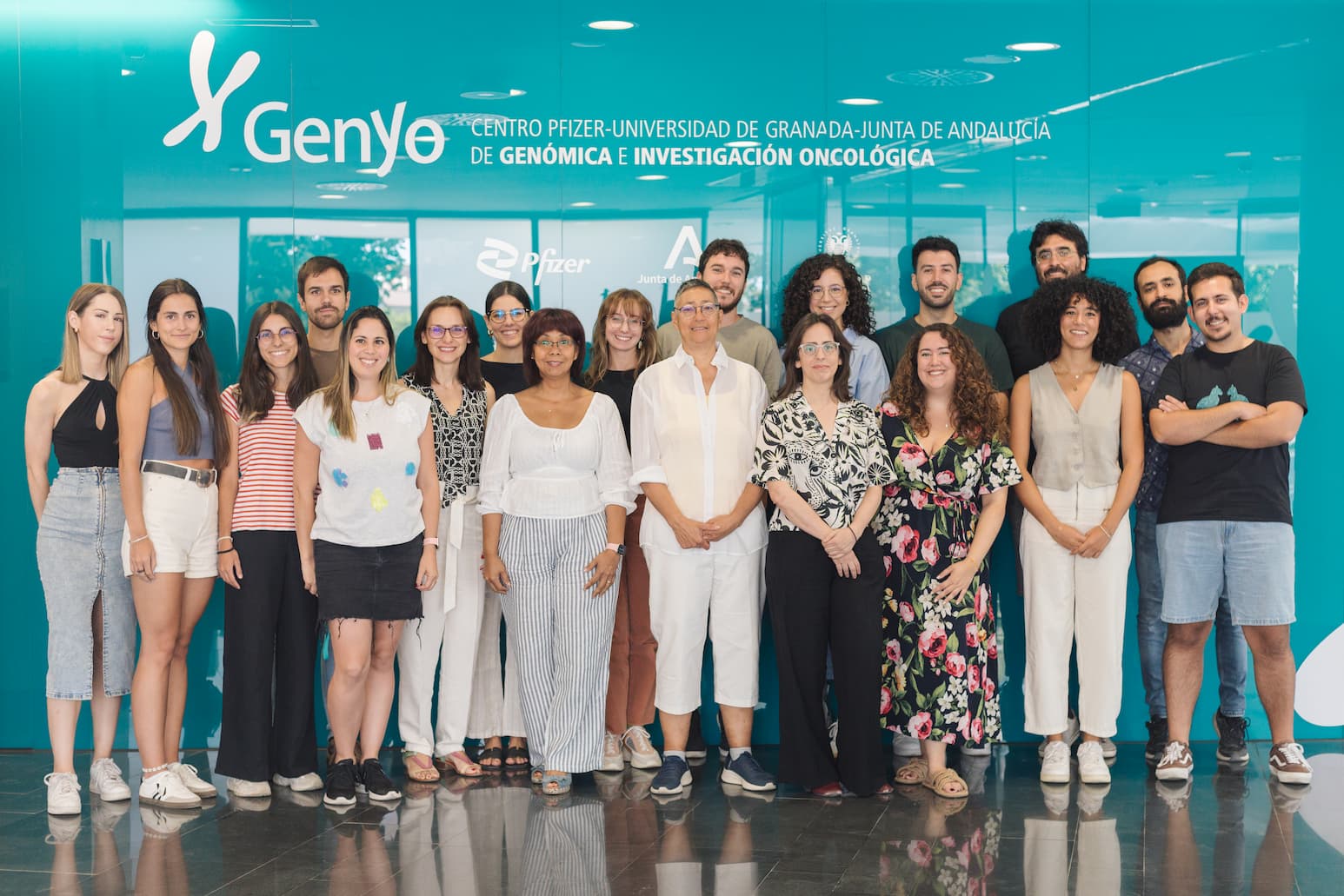There are no projects in the garbage can.
Genetics and Genomics of Immune-Mediated Diseases
Most chronic diseases are complex having multiple factors behind their pathogenesis. Most immune mediated diseases are considered inflammatory with processes that may begin through infections, activation of the innate immune system, the adaptive immune system and the immunopathology that while attempting to restore tissue produces tissue damage.

Home - Functional Genomics Area - Strategic Line 1: The Human Genome - Genetics and Genomics of Immune-Mediated Diseases
Most chronic diseases are complex having multiple factors behind their pathogenesis. Most immune mediated diseases are considered inflammatory with processes that may begin through infections, activation of the innate immune system, the adaptive immune system and the immunopathology that while attempting to restore tissue produces tissue damage. The group of Marta Alarcón- Riquelme has focused for years in understanding the genetic of the autoimmune or immune-mediated disease systemic lupus erythematosus and later on the role of various genomic and epigenomic markers that modulate gene expression and functionality of the genetic variants associated with disease. More recently she has been using machine learning to design predictive models of treatment responses using multi-omics integration. Her group has discovered several genes involved in the susceptibility to develop systemic lupus erythematosus. One of the genes, Bank1 has as primary function and impact on B cells that are implicated in the overproduction of specific populations of B cells that infiltrate the kidney, producing autoantibodies leading to kidney damage. In order to understand gene function, the group has been working with preclinical mouse models of disease making use of single cell RNA sequencing to understand which B cell development trajectories the gene impacts on.
Through genotyping, deep sequencing and imputation, the understanding of the genetic architecture of immune-mediated diseases is becoming a fact, but even more, through the combination of multiple layers of data: epigenome, transcriptome and proteome data, it will become even clearer the delineation of the functional variants modulating disease expression. This will be combined with genome editing technology that will help understand the functionality of the genetic architecture in disease.
Over 30-40% of patients with immune-mediated diseases respond poorly or not at all to their medication. There are several explanations one being the heterogeneity of these diseases where the molecular patterns differ between patients with the same diagnosis. Furthermore, a large group of individuals are never diagnosed and remain “undefined” their entire lives. We develop molecular models that predict response to therapies and molecular pathways that may stratify the diseases not into clinical diagnoses but into molecular diagnoses, and we study in-depth the single cell components that differentiate responders from non-responders.
The work on genetics also involves the understanding of the role of rare variants in disease, the role of the Human Leukocyte Antigen (HLA) system in disease and determination of the polygenic risk score. Furthermore, determination of epigenetic modifications particularly detecting methylated CpG sites which reflect environmental versus genetic influence on gene expression changes in disease. The role of the genotype in determining changes in the microbiota composition is also included in the studies described.
Work is also ongoing on urinary liquid biopsy and the early detection of markers and extracellular vesicles in lupus nephritis. This part of the project is led by the senior scientist in the group, Dr Concepción Marañón.
The understanding of the genetic architecture of disease and the mechanisms through which genes lead to the development of specific cellular populations and the pathways through which these do so, is of major importance to the application of new therapies, the early diagnosis of diseases with very late diagnostic rates, and the understanding of the mechanisms of susceptibility genes in the pathogenesis of disease and the molecular stratification of diseases also including those who never receive a clinical diagnosis, are important questions that require innovative approaches and multidisciplinary collaborations.
Despite being relatively rare diseases, systemic autoimmune diseases in conjunction reach about 5% of the population, particularly young and middle-aged women. Immune-mediated diseases affect the complete sphere of diseases, from all organs and systems where an inflammatory process is taking place. Many patients remain several years without a diagnosis and are therefore not treated with new biological drugs, while it is molecularly evident that they do have abnormalities in their immune system cellular patterns of the transcriptome. Earlier diagnosis and proper treatment are some of the social goals my group has. Possibility of predicting treatment responses will be of major importance to initiate the correct therapy and early to avoid organ damage.
Prof Alarcón-Riquelme has trained over 15 PhD students and a large number of postdocs. Her group is composed of 3 senior researchers (Guillermo Barturen, Elena Carnero and Concepción Marañón), each co-supervising PhD and masters students and 5 PhD students. Dr Alarcón-Riquelme is the PI of a Marie Sklodowska Curie predoctoral network called SIGNATURE co-coordinated by Dr Concepción Marañón.
Dr Alarcón-Riquelme has coordinated a European Innovative Medicines Initiative (IMI-JU) funded project known as PRECISESADS (2014-2019) with the participation of the pharma industry and up to 20 academic centers around Europe with a budget of 22M€.
In this study, through the molecular reclassification of systemic autoimmune diseases the group identified new genetic loci involved in inflammation, and groups of individuals who shared molecular signatures, despite having different clinical diagnoses.
The results of this work are now part of the applied personalized medicine research line (SL3). Here, Prof. Alarcón-Riquelme coordinates a major study, 3TR (2019-2026), the largest in the topic of immunology funded by the IMI-JU and major pharmaceutical companies with a budget of 80M€ where 7 immune-mediated diseases are being prospectively studied and analyzed for the mechanisms of response and non-response to treatments.
Dr Alarcón has also a separate collaboration with Astra Zeneca to sequence the genome of several systemic autoimmune and inflammatory diseases and determine proteome modifications that may help identify novel therapeutic targets. Dr Alarcón received recently funding from the Lupus Research Alliance from the United States to perform single cell analyses of responses and non-response to treatments in SLE in paired blood and tissues of active patients. Various collaborations are ongoing with Latin America. Focusing on publications in D1.
Promote senior researchers in the group to apply for national, regional, and European grants, including ERC grants. Increase contacts with the pharmaceutical industry and with international collaborators in the areas of immune-mediated diseases. Obtain new European funding. Continue with the training of PhD students and postdocs. Keep the level of MdM guarantor.

File number: GAP-831434-2
Principal Investigator: Dra. Marta E. Alarcón
Funder: UE
Execution period: 01/09/2019 – 31/08/2026
Principal Investigator: Dra. Marta E. Alarcón
Funder: Lupus Reseach Alliance
File number: PID2020-113776GB-100
Principal Investigator: Dra. Marta E. Alarcón
Funder: Agencia Estatal de investigación
Execution period: 01/01/2021 – 31/08/2025
File number: PID2020-113776GB-100
Principal Investigator: Dra. Marta E. Alarcón y Dra. Isabel Sánchez
Funder: Consejería de Salud
Execution period: 28/11/2024 – 27/11/2027
Principal Investigator: Dra. Marta E. Alarcón
Funder: Astra Zeneca
Execution period: 01/01/2024 – 01/01/2027
File number: 101072891
Principal Investigator: Dra. Marta Alarcón Riquelme y Dra. Concepción Marañón Lizana
Funder: UE
Execution period: 01/01/2023 – 31/12/2026
File number: PI21/01151
Principal Investigator: Dra. Concepción Marañón Lizana
Funder: ISCIII
Execution period: 01/01/2022 – 30/09/2025
File number: PI24/01330
Principal Investigator: Dra. Concepción Marañón Lizana
Funder: ISCIII
Execution period: 01/01/2025 – 31/12/2027
File number: 101152617
Principal Investigator: Dra. Concepción Marañón Lizana
Funder: UE
Execution period: 01/04/2025 – 30/09/2027
File number: 30BM280101
Principal Investigator: Dra. Elena Carnero
Funder: CUII
Execution period: 19/09/2023 – 19/03/2028
A highly prevalent lupus risk haplotype increases IRF7-dependent induction of IFN-α, enhancing antiviral defense and exacerbating autoimmunity.
Authors: Virolainen SJ, Creighton K, Dashtiahangar M, Krishnamurthy D, Parks L, Forney C, Ampadu B, Rudrapatna AN, Dunn KA, Parameswaran S, Hesse HK, Chen X, VonHandorf A, Edsall LE, Yin C, Lynch A, Gittens OE, Diouf AA, Jones SH, Hass M, Javier E, Donmez OA, Keddari Y, Danzinger O, Seelamneni H, Namjou-Khales B, Ainsworth HC, Comeau ME, Marion MC, Glenn SB, Nath SK, Freedman BI, Tsao BP, Kamen DL, Brown EE, Gilkeson GS, Alarcón GS, Reveille JD, James JA, Criswell LA, Vilá LM, Alarcón-Riquelme ME, Petri M, Scofield RH, Kimberly RP, Ramsey-Goldman R, Bae SC, Graham DC, Vyse TJ, Guthridge JM, Gaffney PM, Langefeld CD, Kelly JA, Kaufman KM, Sivils K, Harley JB, Shen N, Lawson LP, Baglaenko Y, Miraldi ER, Rosenberg BR, Siggers T, Waggoner SN, Weirauch MT, Kottyan LC
01/2026 - medRxiv : the preprint server for health sciences
Old and new autoantibodies in systemic lupus erythematosus.
Authors: Parodis I, Nikolopoulos D, Brylid A, Hultgren O, Alarcón-Riquelme ME, Sjöwall C
01/2026 - Expert review of clinical immunology
Untargeted breathomics identifies metabolic signatures of immune activity, intestinal integrity, and fatigue in systemic lupus erythematosus.
Authors: Parodis I, Iacubino M, Rocco L, Nikolopoulos D, Palazzo L, Grimmett L, Kerr M, Bellocchi C, Vigone B, Santaniello A, Barturen G, Voskuyl AE, Alarcón-Riquelme ME, Beretta L
01/2026 - Annals of the rheumatic diseases
Transcriptomic stratification predicts response to rituximab, abatacept, or the association of hydroxychloroquine and leflunomide in 3 randomised controlled clinical trials of Sjögren's disease.
Authors: Chevet B, Devauchelle-Pensec V, Pontarini E, Baloche V, Bombardieri M, Bowman SJ, Barnes M, Sreih AG, Liu J, Kelly S, Christodoulou A, Moingeon P, Laigle L, Soret P, Le Dantec C, Pers JO, Alarcon-Riquelme ME, Barturen G, Mariette X, van Roon J, Seror R, Nocturne G, Cornec D, Foulquier N, PRECISEADS Clinical Consortium, NECESSITY consortium
12/2025 - Annals of the rheumatic diseases
Benchmarking single-sample gene set scoring methods for application in precision medicine.
Authors: Toro-Domínguez D, Wang C, Ellson-Lancho I, Martorell-Marugán J, López-Domínguez R, Carmona-Sáez P, Alarcón-Riquelme ME, Baribaud F
11/2025 - Briefings in bioinformatics
Distinct Effects of Complement C4A and C4B Copy Numbers in Systemic Sclerosis Serological and Clinical Subtypes.
Authors: Martínez-López J, Rangel-Peláez C, Rodriguez-Martin I, Guillen-Del-Castillo A, Simeón-Aznar CP, Callejas JL, Distler O, International SSc Group, PRECISESADs Clinical Consortium, Proudman SM, Nikpour M, Australian Scleroderma Interest Group (ASIG), Hunzelmann N, Moroncini G, de Vries-Bouwstra JK, Herrick AL, Allanore Y, Alarcon-Riquelme ME, Beretta L, Assassi S, Denton CP, Mayes MD, Martin J, Acosta-Herrera M, Kerick M
11/2025 - Arthritis & rheumatology (Hoboken, N.J.)
Identification of urinary bacterial genes as biomarkers for non-invasive diagnosis of renal lupus.
Authors: Pérez-Carrasco V, Soriano-Lerma A, Guzzi C, García-Martín ML, Tello MJ, Linde-Rodríguez Á, Sánchez-Martín V, Ortiz-González M, PRECISESADS Clinical Consortium, Gutiérrez-Fernández J, Alarcón-Riquelme ME, Soriano M, Marañón C, García-Salcedo JA
09/2025 - Biomarker research
Discovery of core genes for systemic lupus erythematosus via genome-wide aggregated trans-effects analysis.
Authors: Iakovliev A, Castellini-Pérez O, Erabadda B, PRECISESADS Clinical Consortium, PRECISESADS Flow Cytometry Consortium, Martín J, Barturen G, McKeigue PM, Carnero-Montoro E, Alarcón-Riquelme ME, Spiliopoulou A
10/2025 - Genes and immunity
Optimized network inference for immune diseased single cells.
Authors: Tejero EM, Vaz DJ, Barturen G, Rivas-Torrubia M, Alarcón-Riquelme ME, Kolch W, Matallanas D
07/2025 - Frontiers in immunology
Bank1 deficiency reshapes the gut microbiota of lupus mice towards an anti-inflammatory composition.
Authors: Galicia G, Botía-Sánchez M, Toro-Dominguez D, García AL, Valera JR, Gómez Hernández G, Fernandez RM, Carmona N, Luque G, Morell M, Varela N, Pérez-Cozar F, Margolles A, Aguilera M, Alarcón-Riquelme ME
07/2025 - Frontiers in immunology
Differential molecular signatures in response to CD19-CAR T cell therapy compared with conventional pharmacotherapy in systemic lupus erythematosus.
Authors: Garantziotis P, Beretta L, Lindblom J, Moysidou GS, Nikolopoulos D, Grieshaber-Bouyer R, Hagen M, Bergmann C, Wirsching A, Bozec A, PRECISESADS Clinical Consortium, Schneider M, Barturen G, Bertsias G, Boumpas DT, Alarcón-Riquelme ME, Mackensen A, Schett G, Parodis I
01/2026 - Annals of the rheumatic diseases
Dysregulation of innate and adaptive lymphoid immunity may have implications for symptom attribution and predict responses to targeted therapies in neuropsychiatric systemic lupus erythematosus.
Authors: Lindblom J, Barturen G, Beretta L, Toro-Domínguez D, Carnero-Montoro E, Borghi MO, Castillo J, Iacobaeus E, Enman Y, PRECISESADS Clinical Consortium, Mohan C, Alarcón-Riquelme ME, Nikolopoulos D, Parodis I
06/2025 - Journal of translational autoimmunity
Variants in the DDX6-CXCR5 autoimmune disease risk locus influence the regulatory network in immune cells and salivary gland.
Authors: Wiley MM, Radziszewski M, Khatri B, Joachims ML, Tessneer KL, Stolarczyk AM, Yao S, Li J, Pritchett-Frazee C, Johnston AA, Rasmussen A, Anaya JM, Aqrawi LA, Bae SC, Baecklund E, Björk A, Brun JG, Bucher SM, Dand N, Eloranta ML, Engelke F, Forsblad-d'Elia H, Fugmann C, Glenn SB, Gong C, Gottenberg JE, Hammenfors D, Imgenberg-Kreuz J, Jensen JL, Johnsen SJA, Jonsson MV, Kelly JA, Khanam S, Kim K, Kvarnström M, Mandl T, Martín J, Morris DL, Nocturne G, Norheim KB, Olsson P, Palm Ø, Pers JO, Rhodus NL, Sjöwall C, Skarstein K, Taylor KE, Tombleson P, Thorlacius GE, Venuturupalli SR, Vital EM, Wallace DJ, Radfar L, Brennan MT, James JA, Scofield RH, Gaffney PM, Criswell LA, Jonsson R, Appel S, Eriksson P, Bowman SJ, Omdal R, Rönnblom L, Warner BM, Rischmueller M, Witte T, Farris AD, Mariette X, Shiboski CH, Sjögren’s International Collaborative Clinical Alliance (SICCA), Wahren-Herlenius M, Alarcón-Riquelme ME, PRECISESADS Clinical Consortium, Ng WF, UK Primary Sjögren’s Syndrome Registry, Sivils KL, Guthridge JM, Adrianto I, Vyse TJ, Tsao BP, Nordmark G, Lessard CJ
09/2025 - Annals of the rheumatic diseases
Identifying Predictive Biomarkers of Response in Patients With Rheumatoid Arthritis Treated With Adalimumab Using Machine Learning Analysis of Whole-Blood Transcriptomics Data.
Authors: Yap CF, Nair N, Morgan AW, Isaacs JD, Wilson AG, Hyrich K, Barturen G, Riva-Torrubia M, Gut M, Gut I, Alarcón Riquelme ME, Barton A, Plant D
12/2025 - Arthritis & rheumatology (Hoboken, N.J.)
New IgG and IgA autoantibody specificities against DNA-binding and RNA-binding proteins discriminate systemic lupus erythematosus from health and non-lupus autoimmunity-could anti-LIN28A enhance precision in diagnostics?
Authors: Parodis I, Lagutkin D, Lindblom J, Idborg H, Beretta L, Borghi MO, PRECISESADS Clinical Consortium, Peyper JM, Barturen G, Jakobsson PJ, Alarcón-Riquelme ME, Sherina N, Nikolopoulos D
07/2025 - Annals of the rheumatic diseases
Novel IgG and IgA autoantibodies validated in two independent cohorts are associated with disease activity and determine organ manifestations in systemic lupus erythematosus: implications for anti-LIN28A, anti-HMGN5, anti-IRF5, and anti-TGIF1.
Authors: Lindblom J, Lagutkin D, Sherina N, Idborg H, Beretta L, Borghi MO, PRECISESADS Clinical Consortium, Peyper JM, Barturen G, Jakobsson PJ, Alarcón-Riquelme ME, Nikolopoulos D, Parodis I
07/2025 - Annals of the rheumatic diseases
Enhancing Genetic Studies on Rheumatic Diseases in Latin America: The IARGE-RD Initiative.
Authors: Durán J, Pons-Estel BA, Alarcón-Riquelme ME, Díaz Peña R
06/2025 - The Journal of rheumatology
Pheno-Ranker: a toolkit for comparison of phenotypic data stored in GA4GH standards and beyond.
Authors: Leist IC, Rivas-Torrubia M, Alarcón-Riquelme ME, Barturen G, Consortium PC, Gut IG, Rueda M
12/2024 - BMC bioinformatics
Revisiting the heterogeneity of interferon-related autoimmune diseases.
Authors: Barturen G, Alarcón-Riquelme ME
01/2025 - Nature reviews. Rheumatology
A Strong Dysregulated Myeloid Component in the Epigenetic Landscape of Systemic Sclerosis: An Integrated DNA Methylome and Transcriptome Analysis.
Authors: Martínez-López J, Ortiz-Fernandez L, Estupiñán-Moreno E, Kerick M, Andrés-León E, Terron-Camero LC, Carnero-Montoro E, Barturen G, Beretta L, Almeida I, PRECISESADS Clinical Consortium, Alarcón-Riquelme ME, Ballestar E, Acosta-Herrera M, Martín J
04/2025 - Arthritis & rheumatology (Hoboken, N.J.)
Stratification according to autoantibody status in systemic sclerosis reveals distinct molecular signatures.
Authors: Rouvière B, Le Dantec C, Bettacchioli E, Beretta L, Foulquier N, Cao C, Jamin C, Pers JO, Kerick M, Martin J, PRECISESADS Clinical Consortium, PRECISESADS Metabolomic Study Group, Alarcón-Riquelme ME, de Moreuil C, Cornec D, Hillion S
10/2024 - Annals of the rheumatic diseases
Bank1 modulates the differentiation and molecular profile of key B cell populations in autoimmunity.
Authors: Gómez Hernández G, Domínguez T, Galicia G, Morell M, Alarcón-Riquelme ME
08/2024 - JCI insight
Variants in the DDX6-CXCR5 autoimmune disease risk locus influence the regulatory network in immune cells and salivary gland.
Authors: Wiley MM, Khatri B, Joachims ML, Tessneer KL, Stolarczyk AM, Rasmussen A, Anaya JM, Aqrawi LA, Bae SC, Baecklund E, Björk A, Brun JG, Bucher SM, Dand N, Eloranta ML, Engelke F, Forsblad-d'Elia H, Fugmann C, Glenn SB, Gong C, Gottenberg JE, Hammenfors D, Imgenberg-Kreuz J, Jensen JL, Johnsen SJA, Jonsson MV, Kelly JA, Khanam S, Kim K, Kvarnström M, Mandl T, Martín J, Morris DL, Nocturne G, Norheim KB, Olsson P, Palm Ø, Pers JO, Rhodus NL, Sjöwall C, Skarstein K, Taylor KE, Tombleson P, Thorlacius GE, Venuturupalli S, Vital EM, Wallace DJ, Grundahl KM, Radfar L, Brennan MT, James JA, Scofield RH, Gaffney PM, Criswell LA, Jonsson R, Appel S, Eriksson P, Bowman SJ, Omdal R, Rönnblom L, Warner BM, Rischmueller M, Witte T, Farris AD, Mariette X, Shiboski CH, Sjögren’s International Collaborative Clinical Alliance (SICCA), Wahren-Herlenius M, Alarcón-Riquelme ME, PRECISESADS Clinical Consortium, Ng WF, UK Primary Sjögren’s Syndrome Registry, Sivils KL, Guthridge JM, Adrianto I, Vyse TJ, Tsao BP, Nordmark G, Lessard CJ
10/2023 - bioRxiv : the preprint server for biology
Molecular subtypes explain lupus epigenomic heterogeneity unveiling new regulatory genetic risk variants.
Authors: Castellini-Pérez O, Povedano E, Barturen G, Martínez-Bueno M, Iakovliev A, Kerick M, López-Domínguez R, Marañón C, Martín J, Ballestar E, PRECISEADS Clinical Consortium, PRECISEADS Flow Cytometry Study Group, Borghi MO, Qiu W, Zhu C, Shankara S, Spiliopoulou A, de Rinaldis E, Carnero-Montoro E, Alarcón-Riquelme ME
07/2024 - NPJ genomic medicine
Exploring the contribution of genetics on the clinical manifestations of systemic lupus erythematosus.
Authors: Rodríguez RD, Alarcón-Riquelme ME
12/2024 - Best practice & research. Clinical rheumatology
A Genome-Wide Association Study Suggests New Susceptibility Loci for Primary Antiphospholipid Syndrome.
Authors: Casares-Marfil D, Martínez-Bueno M, Borghi MO, Pons-Estel G, PRECISESADS Clinical Consortium, Reales G, Zuo Y, Espinosa G, Radstake T, van den Hoogen LL, Wallace C, Guthridge J, James JA, Cervera R, Meroni PL, Martin J, Knight JS, Alarcón-Riquelme ME, Sawalha AH
11/2024 - Arthritis & rheumatology (Hoboken, N.J.)
Interferon and B-cell Signatures Inform Precision Medicine in Lupus Nephritis.
Authors: Parodis I, Lindblom J, Toro-Domínguez D, Beretta L, Borghi MO, Castillo J, Carnero-Montoro E, Enman Y, Mohan C, Alarcón-Riquelme ME, Barturen G, Nikolopoulos D, PRECISESADS Clinical Consortium
03/2024 - Kidney international reports
Classification of systemic lupus erythematosus: From the development of classification criteria to a new taxonomy?
Authors: Aringer M, Toro-Domínguez D, Alarcón-Riquelme ME
12/2023 - Best practice & research. Clinical rheumatology
Approaching Mass Cytometry Translational Studies by Experimental and Data Curation Settings.
Authors: Rybakowska P, Alarcón-Riquelme ME, Marañón C
01/2024 - Methods in molecular biology (Clifton, N.J.)
A genome-wide association study suggests new susceptibility loci for primary antiphospholipid syndrome.
Authors: Casares-Marfil D, Martínez-Bueno M, Borghi MO, Pons-Estel G, PRECISESADS Clinical Consortium, Reales G, Zuo Y, Espinosa G, Radstake T, van den Hoogen LL, Wallace C, Guthridge J, James JA, Cervera R, Meroni PL, Martin J, Knight JS, Alarcón-Riquelme ME, Sawalha AH
12/2023 - medRxiv : the preprint server for health sciences
Molecular characterisation of lupus low disease activity state (LLDAS) and DORIS remission by whole-blood transcriptome-based pathways in a pan-European systemic lupus erythematosus cohort.
Authors: Parodis I, Lindblom J, Barturen G, Ortega-Castro R, Cervera R, Pers JO, Genre F, Hiepe F, Gerosa M, Kovács L, De Langhe E, Piantoni S, Stummvoll G, Vasconcelos C, Vigone B, Witte T, PRECISESADS Clinical Consortium, Alarcón-Riquelme ME, Beretta L
06/2024 - Annals of the rheumatic diseases
A genome-wide association study for survival from a multi-centre European study identified variants associated with COVID-19 risk of death.
Authors: Minnai F, Biscarini F, Esposito M, Dragani TA, Bujanda L, Rahmouni S, Alarcón-Riquelme ME, Bernardo D, Carnero-Montoro E, Buti M, Zeberg H, Asselta R, Romero-Gómez M, GEN-COVID Multicenter Study, Fernandez-Cadenas I, Fallerini C, Zguro K, Croci S, Baldassarri M, Bruttini M, Furini S, Renieri A, Colombo F
02/2024 - Scientific reports
Association of Combined Anti-Ro52/TRIM21 and Anti-Ro60/SSA Antibodies With Increased Sjögren Disease Severity Through Interferon Pathway Activation.
Authors: Bettacchioli E, Saraux A, Tison A, Cornec D, Dueymes M, Foulquier N, Hillion S, Roguedas-Contios AM, Benyoussef AA, Alarcon-Riquelme ME, Pers JO, Devauchelle-Pensec V, PRECISESADS Clinical Consortium, and PRECISESADS Sjögren Consortium
05/2024 - Arthritis & rheumatology (Hoboken, N.J.)
Serum profiling identifies CCL8, CXCL13, and IL-1RA as markers of active disease in patients with systemic lupus erythematosus.
Authors: Lindblom J, Beretta L, Borghi MO, PRECISESADS Clinical Consortium, Alarcón-Riquelme ME, Parodis I
11/2023 - Frontiers in immunology
Response to the letter 'testing the effectiveness of MyPROSLE in classifying patients with lupus nephritis'.
Authors: Toro-Domínguez D, Martorell-Marugán J, Martinez-Bueno M, López-Domínguez R, Carnero-Montoro E, Barturen G, Goldman D, Petri M, Carmona-Sáez P, Alarcón-Riquelme ME
11/2023 - Briefings in bioinformatics
Local Ancestry at the Major Histocompatibility Complex Region is Not a Major Contributor to Disease Heterogeneity in a Multiethnic Lupus Cohort.
Authors: Solomon O, Lanata CM, Adams C, Nititham J, Taylor KE, Chung SA, Yazdany J, Dall'Era M, Pons-Estel BA, Tusié-Luna T, Tsao B, Morand E, Alarcón-Riquelme ME, Barcellos LF, Criswell LA
04/2024 - Arthritis & rheumatology (Hoboken, N.J.)
Type 1 interferons: A target for immune-mediated inflammatory diseases (IMIDs).
Authors: Mathian A, Felten R, Alarcon-Riquelme ME, Psarras A, Mertz P, Chasset F, Vital EM, Arnaud L
03/2024 - Joint bone spine
A basket genetic trial of the vasculitides.
Authors: Carnero-Montoro E, Alarcón-Riquelme ME
09/2023 - Nature reviews. Rheumatology
Gut epithelial barrier dysfunction in lupus triggers a differential humoral response against gut commensals.
Authors: Botía-Sánchez M, Galicia G, Albaladejo-Marico L, Toro-Domínguez D, Morell M, Marcos-Fernández R, Margolles A, Alarcón-Riquelme ME
05/2023 - Frontiers in immunology
Lack of strong innate immune reactivity renders macrophages alone unable to control productive Varicella-Zoster Virus infection in an isogenic human iPSC-derived neuronal co-culture model.
Authors: Van Breedam E, Buyle-Huybrecht T, Govaerts J, Meysman P, Bours A, Boeren M, Di Stefano J, Caers T, De Reu H, Dirkx L, Schippers J, Bartholomeus E, Lebrun M, Sadzot-Delvaux C, Rybakowska P, Alarcón-Riquelme ME, Marañón C, Laukens K, Delputte P, Ogunjimi B, Ponsaerts P
05/2023 - Frontiers in immunology
Corrigendum to 'Distinct gene dysregulation patterns herald precision medicine potentiality in systemic lupus erythematosus' [J. Autoimmun. 136 (April 2023) 103025].
Authors: Lindblom J, Toro-Domínguez D, Carnero-Montoro E, Beretta L, Borghi MO, Castillo J, Enman Y, PRECISESADS Clinical Consortium, Mohan C, Alarcón-Riquelme ME, Barturen G, Parodis I
11/2023 - Journal of autoimmunity
Distinct gene dysregulation patterns herald precision medicine potentiality in systemic lupus erythematosus.
Authors: Lindblom J, Toro-Domínguez D, Carnero-Montoro E, Beretta L, Borghi MO, Castillo J, Enman Y, PRECISESADS Clinical Consortium, Mohan C, Alarcón-Riquelme ME, Barturen G, Parodis I
04/2023 - Journal of autoimmunity
Author Correction: Genome-wide association study identifies Sjögren's risk loci with functional implications in immune and glandular cells.
Authors: Khatri B, Tessneer KL, Rasmussen A, Aghakhanian F, Reksten TR, Adler A, Alevizos I, Anaya JM, Aqrawi LA, Baecklund E, Brun JG, Bucher SM, Eloranta ML, Engelke F, Forsblad-d'Elia H, Glenn SB, Hammenfors D, Imgenberg-Kreuz J, Jensen JL, Johnsen SJA, Jonsson MV, Kvarnström M, Kelly JA, Li H, Mandl T, Martín J, Nocturne G, Norheim KB, Palm Ø, Skarstein K, Stolarczyk AM, Taylor KE, Teruel M, Theander E, Venuturupalli S, Wallace DJ, Grundahl KM, Hefner KS, Radfar L, Lewis DM, Stone DU, Kaufman CE, Brennan MT, Guthridge JM, James JA, Scofield RH, Gaffney PM, Criswell LA, Jonsson R, Eriksson P, Bowman SJ, Omdal R, Rönnblom L, Warner B, Rischmueller M, Witte T, Farris AD, Mariette X, Alarcon-Riquelme ME, PRECISESADS Clinical Consortium, Shiboski CH, Sjögren’s International Collaborative Clinical Alliance (SICCA), Wahren-Herlenius M, Ng WF, UK Primary Sjögren’s Syndrome Registry, Sivils KL, Adrianto I, Nordmark G, Lessard CJ
02/2023 - Nature communications
Differential diagnosis of systemic lupus erythematosus and Sjögren's syndrome using machine learning and multi-omics data.
Authors: Martorell-Marugán J, Chierici M, Jurman G, Alarcón-Riquelme ME, Carmona-Sáez P
01/2023 - Computers in biology and medicine
Protocol for large scale whole blood immune monitoring by mass cytometry and Cyto Quality Pipeline.
Authors: Rybakowska P, Van Gassen S, Martorell Marugán J, Quintelier K, Saeys Y, Alarcón-Riquelme ME, Marañón C
10/2022 - STAR protocols
Author Correction: Genome-wide association study identifies Sjögren's risk loci with functional implications in immune and glandular cells.
Authors: Khatri B, Tessneer KL, Rasmussen A, Aghakhanian F, Reksten TR, Adler A, Alevizos I, Anaya JM, Aqrawi LA, Baecklund E, Brun JG, Bucher SM, Eloranta ML, Engelke F, Forsblad-d'Elia H, Glenn SB, Hammenfors D, Imgenberg-Kreuz J, Jensen JL, Johnsen SJA, Jonsson MV, Kvarnström M, Kelly JA, Li H, Mandl T, Martín J, Nocturne G, Norheim KB, Palm Ø, Skarstein K, Stolarczyk AM, Taylor KE, Teruel M, Theander E, Venuturupalli S, Wallace DJ, Grundahl KM, Hefner KS, Radfar L, Lewis DM, Stone DU, Kaufman CE, Brennan MT, Guthridge JM, James JA, Scofield RH, Gaffney PM, Criswell LA, Jonsson R, Eriksson P, Bowman SJ, Omdal R, Rönnblom L, Warner B, Rischmueller M, Witte T, Farris AD, Mariette X, Alarcon-Riquelme ME, PRECISESADS Clinical Consortium, Shiboski CH, Sjögren’s International Collaborative Clinical Alliance (SICCA), Wahren-Herlenius M, Ng WF, UK Primary Sjögren’s Syndrome Registry, Sivils KL, Adrianto I, Nordmark G, Lessard CJ
10/2022 - Nature communications
Complement component C4 structural variation and quantitative traits contribute to sex-biased vulnerability in systemic sclerosis.
Authors: Kerick M, Acosta-Herrera M, Simeón-Aznar CP, Callejas JL, Assassi S, International SSc Group, Proudman SM, Nikpour M, Australian Scleroderma Interest Group (ASIG), PRECISESADS Clinical Consortium, Hunzelmann N, Moroncini G, de Vries-Bouwstra JK, Orozco G, Barton A, Herrick AL, Terao C, Allanore Y, Fonseca C, Alarcón-Riquelme ME, Radstake TRDJ, Beretta L, Denton CP, Mayes MD, Martin J
10/2022 - NPJ genomic medicine
Scoring personalized molecular portraits identify Systemic Lupus Erythematosus subtypes and predict individualized drug responses, symptomatology and disease progression.
Authors: Toro-Domínguez D, Martorell-Marugán J, Martinez-Bueno M, López-Domínguez R, Carnero-Montoro E, Barturen G, Goldman D, Petri M, Carmona-Sáez P, Alarcón-Riquelme ME
09/2022 - Briefings in bioinformatics
Whole blood DNA methylation analysis reveals respiratory environmental traits involved in COVID-19 severity following SARS-CoV-2 infection.
Authors: Barturen G, Carnero-Montoro E, Martínez-Bueno M, Rojo-Rello S, Sobrino B, Porras-Perales Ó, Alcántara-Domínguez C, Bernardo D, Alarcón-Riquelme ME
08/2022 - Nature communications
Genome-wide association study identifies Sjögren's risk loci with functional implications in immune and glandular cells.
Authors: Khatri B, Tessneer KL, Rasmussen A, Aghakhanian F, Reksten TR, Adler A, Alevizos I, Anaya JM, Aqrawi LA, Baecklund E, Brun JG, Bucher SM, Eloranta ML, Engelke F, Forsblad-d'Elia H, Glenn SB, Hammenfors D, Imgenberg-Kreuz J, Jensen JL, Johnsen SJA, Jonsson MV, Kvarnström M, Kelly JA, Li H, Mandl T, Martín J, Nocturne G, Norheim KB, Palm Ø, Skarstein K, Stolarczyk AM, Taylor KE, Teruel M, Theander E, Venuturupalli S, Wallace DJ, Grundahl KM, Hefner KS, Radfar L, Lewis DM, Stone DU, Kaufman CE, Brennan MT, Guthridge JM, James JA, Scofield RH, Gaffney PM, Criswell LA, Jonsson R, Eriksson P, Bowman SJ, Omdal R, Rönnblom L, Warner B, Rischmueller M, Witte T, Farris AD, Mariette X, Alarcon-Riquelme ME, PRECISESADS Clinical Consortium, Shiboski CH, Sjögren’s International Collaborative Clinical Alliance (SICCA), Wahren-Herlenius M, Ng WF, UK Primary Sjögren’s Syndrome Registry, Sivils KL, Adrianto I, Nordmark G, Lessard CJ
07/2022 - Nature communications
A Summary on the Genetics of Systemic Lupus Erythematosus, Rheumatoid Arthritis, Systemic Sclerosis, and Sjögren's Syndrome.
Authors: Ortíz-Fernández L, Martín J, Alarcón-Riquelme ME
06/2023 - Clinical reviews in allergy & immunology
Novel genes and sex differences in COVID-19 severity.
Authors: Cruz R, Diz-de Almeida S, López de Heredia M, Quintela I, Ceballos FC, Pita G, Lorenzo-Salazar JM, González-Montelongo R, Gago-Domínguez M, Sevilla Porras M, Tenorio Castaño JA, Nevado J, Aguado JM, Aguilar C, Aguilera-Albesa S, Almadana V, Almoguera B, Alvarez N, Andreu-Bernabeu Á, Arana-Arri E, Arango C, Arranz MJ, Artiga MJ, Baptista-Rosas RC, Barreda-Sánchez M, Belhassen-Garcia M, Bezerra JF, Bezerra MAC, Boix-Palop L, Brion M, Brugada R, Bustos M, Calderón EJ, Carbonell C, Castano L, Castelao JE, Conde-Vicente R, Cordero-Lorenzana ML, Cortes-Sanchez JL, Corton M, Darnaude MT, De Martino-Rodríguez A, Del Campo-Pérez V, Diaz de Bustamante A, Domínguez-Garrido E, Luchessi AD, Eiros R, Estigarribia Sanabria GM, Carmen Fariñas M, Fernández-Robelo U, Fernández-Rodríguez A, Fernández-Villa T, Gil-Fournier B, Gómez-Arrue J, González Álvarez B, Gonzalez Bernaldo de Quirós F, González-Peñas J, Gutiérrez-Bautista JF, Herrero MJ, Herrero-Gonzalez A, Jimenez-Sousa MA, Lattig MC, Liger Borja A, Lopez-Rodriguez R, Mancebo E, Martín-López C, Martín V, Martinez-Nieto O, Martinez-Lopez I, Martinez-Resendez MF, Martinez-Perez A, Mazzeu JF, Merayo Macías E, Minguez P, Moreno Cuerda V, Silbiger VN, Oliveira SF, Ortega-Paino E, Parellada M, Paz-Artal E, Santos NPC, Pérez-Matute P, Perez P, Pérez-Tomás ME, Perucho T, Pinsach-Abuin ML, Pompa-Mera EN, Porras-Hurtado GL, Pujol A, Ramiro León S, Resino S, Fernandes MR, Rodríguez-Ruiz E, Rodriguez-Artalejo F, Rodriguez-Garcia JA, Ruiz Cabello F, Ruiz-Hornillos J, Ryan P, Soria JM, Souto JC, Tamayo E, Tamayo-Velasco A, Taracido-Fernandez JC, Teper A, Torres-Tobar L, Urioste M, Valencia-Ramos J, Yáñez Z, Zarate R, Nakanishi T, Pigazzini S, Degenhardt F, Butler-Laporte G, Maya-Miles D, Bujanda L, Bouysran Y, Palom A, Ellinghaus D, Martínez-Bueno M, Rolker S, Amitrano S, Roade L, Fava F, Spinner CD, Prati D, Bernardo D, Garcia F, Darcis G, Fernández-Cadenas I, Holter JC, Banales JM, Frithiof R, Duga S, Asselta R, Pereira AC, Romero-Gómez M, Nafría-Jiménez B, Hov JR, Migeotte I, Renieri A, Planas AM, Ludwig KU, Buti M, Rahmouni S, Alarcón-Riquelme ME, Schulte EC, Franke A, Karlsen TH, Valenti L, Zeberg H, Richards B, Ganna A, Boada M, de Rojas I, Ruiz A, Sánchez-Juan P, Real LM, SCOURGE Cohort Group, HOSTAGE Cohort Group, GRA@CE Cohort Group, Guillen-Navarro E, Ayuso C, González-Neira A, Riancho JA, Rojas-Martinez A, Flores C, Lapunzina P, Carracedo A
11/2022 - Human molecular genetics
Machine Learning for the Identification of a Common Signature for Anti-SSA/Ro 60 Antibody Expression Across Autoimmune Diseases.
Authors: Foulquier N, Le Dantec C, Bettacchioli E, Jamin C, Alarcón-Riquelme ME, Pers JO
10/2022 - Arthritis & rheumatology (Hoboken, N.J.)
Transcriptome Studies in Lupus Nephritis.
Authors: Alarcón-Riquelme ME
04/2022 - Archivum immunologiae et therapiae experimentalis
A glimpse into the future of systemic lupus erythematosus.
Authors: Aringer M, Alarcón-Riquelme ME, Clowse M, Pons-Estel GJ, Vital EM, Dall'Era M
03/2022 - Therapeutic advances in musculoskeletal disease
SIDT1 plays a key role in type I IFN responses to nucleic acids in plasmacytoid dendritic cells and mediates the pathogenesis of an imiquimod-induced psoriasis model.
Authors: Morell M, Varela N, Castillejo-López C, Coppard C, Luque MJ, Wu YY, Martín-Morales N, Pérez-Cózar F, Gómez-Hernández G, Kumar R, O'Valle F, Alarcón-Riquelme ME, Marañón C
02/2022 - EBioMedicine
Integrative epigenomics in Sjögren´s syndrome reveals novel pathways and a strong interaction between the HLA, autoantibodies and the interferon signature.
Authors: Teruel M, Barturen G, Martínez-Bueno M, Castellini-Pérez O, Barroso-Gil M, Povedano E, Kerick M, Català-Moll F, Makowska Z, Buttgereit A, PRECISESADS Clinical Consortium, PRECISESADS Flow Cytometry Study Group, Pers JO, Marañón C, Ballestar E, Martin J, Carnero-Montoro E, Alarcón-Riquelme ME
12/2021 - Scientific reports
Evaluating the Impact of Sex-Biased Genetic Admixture in the Americas through the Analysis of Haplotype Data.
Authors: Ongaro L, Molinaro L, Flores R, Marnetto D, Capodiferro MR, Alarcón-Riquelme ME, Moreno-Estrada A, Mabunda N, Ventura M, Tambets K, Achilli A, Capelli C, Metspalu M, Pagani L, Montinaro F
10/2021 - Genes
Age-dependent impact of the major common genetic risk factor for COVID-19 on severity and mortality.
Authors: Nakanishi T, Pigazzini S, Degenhardt F, Cordioli M, Butler-Laporte G, Maya-Miles D, Bujanda L, Bouysran Y, Niemi ME, Palom A, Ellinghaus D, Khan A, Martínez-Bueno M, Rolker S, Amitrano S, Roade Tato L, Fava F, FinnGen, COVID-19 Host Genetics Initiative (HGI), Spinner CD, Prati D, Bernardo D, Garcia F, Darcis G, Fernández-Cadenas I, Holter JC, Banales JM, Frithiof R, Kiryluk K, Duga S, Asselta R, Pereira AC, Romero-Gómez M, Nafría-Jiménez B, Hov JR, Migeotte I, Renieri A, Planas AM, Ludwig KU, Buti M, Rahmouni S, Alarcón-Riquelme ME, Schulte EC, Franke A, Karlsen TH, Valenti L, Zeberg H, Richards JB, Ganna A
12/2021 - The Journal of clinical investigation
PeacoQC: Peak-based selection of high quality cytometry data.
Authors: Emmaneel A, Quintelier K, Sichien D, Rybakowska P, Marañón C, Alarcón-Riquelme ME, Van Isterdael G, Van Gassen S, Saeys Y
04/2022 - Cytometry. Part A : the journal of the International Society for Analytical Cytology
Genomic and phenotypic insights from an atlas of genetic effects on DNA methylation.
Authors: Min JL, Hemani G, Hannon E, Dekkers KF, Castillo-Fernandez J, Luijk R, Carnero-Montoro E, Lawson DJ, Burrows K, Suderman M, Bretherick AD, Richardson TG, Klughammer J, Iotchkova V, Sharp G, Al Khleifat A, Shatunov A, Iacoangeli A, McArdle WL, Ho KM, Kumar A, Söderhäll C, Soriano-Tárraga C, Giralt-Steinhauer E, Kazmi N, Mason D, McRae AF, Corcoran DL, Sugden K, Kasela S, Cardona A, Day FR, Cugliari G, Viberti C, Guarrera S, Lerro M, Gupta R, Bollepalli S, Mandaviya P, Zeng Y, Clarke TK, Walker RM, Schmoll V, Czamara D, Ruiz-Arenas C, Rezwan FI, Marioni RE, Lin T, Awaloff Y, Germain M, Aïssi D, Zwamborn R, van Eijk K, Dekker A, van Dongen J, Hottenga JJ, Willemsen G, Xu CJ, Barturen G, Català-Moll F, Kerick M, Wang C, Melton P, Elliott HR, Shin J, Bernard M, Yet I, Smart M, Gorrie-Stone T, BIOS Consortium, Shaw C, Al Chalabi A, Ring SM, Pershagen G, Melén E, Jiménez-Conde J, Roquer J, Lawlor DA, Wright J, Martin NG, Montgomery GW, Moffitt TE, Poulton R, Esko T, Milani L, Metspalu A, Perry JRB, Ong KK, Wareham NJ, Matullo G, Sacerdote C, Panico S, Caspi A, Arseneault L, Gagnon F, Ollikainen M, Kaprio J, Felix JF, Rivadeneira F, Tiemeier H, van IJzendoorn MH, Uitterlinden AG, Jaddoe VWV, Haley C, McIntosh AM, Evans KL, Murray A, Räikkönen K, Lahti J, Nohr EA, Sørensen TIA, Hansen T, Morgen CS, Binder EB, Lucae S, Gonzalez JR, Bustamante M, Sunyer J, Holloway JW, Karmaus W, Zhang H, Deary IJ, Wray NR, Starr JM, Beekman M, van Heemst D, Slagboom PE, Morange PE, Trégouët DA, Veldink JH, Davies GE, de Geus EJC, Boomsma DI, Vonk JM, Brunekreef B, Koppelman GH, Alarcón-Riquelme ME, Huang RC, Pennell CE, van Meurs J, Ikram MA, Hughes AD, Tillin T, Chaturvedi N, Pausova Z, Paus T, Spector TD, Kumari M, Schalkwyk LC, Visscher PM, Davey Smith G, Bock C, Gaunt TR, Bell JT, Heijmans BT, Mill J, Relton CL
09/2021 - Nature genetics
Downregulation of exhausted cytotoxic T cells in gene expression networks of multisystem inflammatory syndrome in children.
Authors: Beckmann ND, Comella PH, Cheng E, Lepow L, Beckmann AG, Tyler SR, Mouskas K, Simons NW, Hoffman GE, Francoeur NJ, Del Valle DM, Kang G, Do A, Moya E, Wilkins L, Le Berichel J, Chang C, Marvin R, Calorossi S, Lansky A, Walker L, Yi N, Yu A, Chung J, Hartnett M, Eaton M, Hatem S, Jamal H, Akyatan A, Tabachnikova A, Liharska LE, Cotter L, Fennessy B, Vaid A, Barturen G, Shah H, Wang YC, Sridhar SH, Soto J, Bose S, Madrid K, Ellis E, Merzier E, Vlachos K, Fishman N, Tin M, Smith M, Xie H, Patel M, Nie K, Argueta K, Harris J, Karekar N, Batchelor C, Lacunza J, Yishak M, Tuballes K, Scott I, Kumar A, Jaladanki S, Agashe C, Thompson R, Clark E, Losic B, Peters L, Mount Sinai COVID-19 Biobank Team, Roussos P, Zhu J, Wang W, Kasarskis A, Glicksberg BS, Nadkarni G, Bogunovic D, Elaiho C, Gangadharan S, Ofori-Amanfo G, Alesso-Carra K, Onel K, Wilson KM, Argmann C, Bunyavanich S, Alarcón-Riquelme ME, Marron TU, Rahman A, Kim-Schulze S, Gnjatic S, Gelb BD, Merad M, Sebra R, Schadt EE, Charney AW
08/2021 - Nature communications
Continental-scale genomic analysis suggests shared post-admixture adaptation in the Americas.
Authors: Ongaro L, Mondal M, Flores R, Marnetto D, Molinaro L, Alarcón-Riquelme ME, Moreno-Estrada A, Mabunda N, Ventura M, Tambets K, Hellenthal G, Capelli C, Kivisild T, Metspalu M, Pagani L, Montinaro F
11/2021 - Human molecular genetics
A comprehensive database for integrated analysis of omics data in autoimmune diseases.
Authors: Martorell-Marugán J, López-Domínguez R, García-Moreno A, Toro-Domínguez D, Villatoro-García JA, Barturen G, Martín-Gómez A, Troule K, Gómez-López G, Al-Shahrour F, González-Rumayor V, Peña-Chilet M, Dopazo J, Sáez-Rodríguez J, Alarcón-Riquelme ME, Carmona-Sáez P
06/2021 - BMC bioinformatics
Data processing workflow for large-scale immune monitoring studies by mass cytometry.
Authors: Rybakowska P, Van Gassen S, Quintelier K, Saeys Y, Alarcón-Riquelme ME, Marañón C
05/2021 - Computational and structural biotechnology journal
A new molecular classification to drive precision treatment strategies in primary Sjögren's syndrome.
Authors: Soret P, Le Dantec C, Desvaux E, Foulquier N, Chassagnol B, Hubert S, Jamin C, Barturen G, Desachy G, Devauchelle-Pensec V, Boudjeniba C, Cornec D, Saraux A, Jousse-Joulin S, Barbarroja N, Rodríguez-Pintó I, De Langhe E, Beretta L, Chizzolini C, Kovács L, Witte T, PRECISESADS Clinical Consortium, PRECISESADS Flow Cytometry Consortium, Bettacchioli E, Buttgereit A, Makowska Z, Lesche R, Borghi MO, Martin J, Courtade-Gaiani S, Xuereb L, Guedj M, Moingeon P, Alarcón-Riquelme ME, Laigle L, Pers JO
06/2021 - Nature communications
The Role of BANK1 in B Cell Signaling and Disease.
Authors: Gómez Hernández G, Morell M, Alarcón-Riquelme ME
05/2021 - Cells
B Cells and Microbiota in Autoimmunity.
Authors: Botía-Sánchez M, Alarcón-Riquelme ME, Galicia G
05/2021 - International journal of molecular sciences
The trans-ancestral genomic architecture of glycemic traits.
Authors: Chen J, Spracklen CN, Marenne G, Varshney A, Corbin LJ, Luan J, Willems SM, Wu Y, Zhang X, Horikoshi M, Boutin TS, Mägi R, Waage J, Li-Gao R, Chan KHK, Yao J, Anasanti MD, Chu AY, Claringbould A, Heikkinen J, Hong J, Hottenga JJ, Huo S, Kaakinen MA, Louie T, März W, Moreno-Macias H, Ndungu A, Nelson SC, Nolte IM, North KE, Raulerson CK, Ray D, Rohde R, Rybin D, Schurmann C, Sim X, Southam L, Stewart ID, Wang CA, Wang Y, Wu P, Zhang W, Ahluwalia TS, Appel EVR, Bielak LF, Brody JA, Burtt NP, Cabrera CP, Cade BE, Chai JF, Chai X, Chang LC, Chen CH, Chen BH, Chitrala KN, Chiu YF, de Haan HG, Delgado GE, Demirkan A, Duan Q, Engmann J, Fatumo SA, Gayán J, Giulianini F, Gong JH, Gustafsson S, Hai Y, Hartwig FP, He J, Heianza Y, Huang T, Huerta-Chagoya A, Hwang MY, Jensen RA, Kawaguchi T, Kentistou KA, Kim YJ, Kleber ME, Kooner IK, Lai S, Lange LA, Langefeld CD, Lauzon M, Li M, Ligthart S, Liu J, Loh M, Long J, Lyssenko V, Mangino M, Marzi C, Montasser ME, Nag A, Nakatochi M, Noce D, Noordam R, Pistis G, Preuss M, Raffield L, Rasmussen-Torvik LJ, Rich SS, Robertson NR, Rueedi R, Ryan K, Sanna S, Saxena R, Schraut KE, Sennblad B, Setoh K, Smith AV, Sparsø T, Strawbridge RJ, Takeuchi F, Tan J, Trompet S, van den Akker E, van der Most PJ, Verweij N, Vogel M, Wang H, Wang C, Wang N, Warren HR, Wen W, Wilsgaard T, Wong A, Wood AR, Xie T, Zafarmand MH, Zhao JH, Zhao W, Amin N, Arzumanyan Z, Astrup A, Bakker SJL, Baldassarre D, Beekman M, Bergman RN, Bertoni A, Blüher M, Bonnycastle LL, Bornstein SR, Bowden DW, Cai Q, Campbell A, Campbell H, Chang YC, de Geus EJC, Dehghan A, Du S, Eiriksdottir G, Farmaki AE, Frånberg M, Fuchsberger C, Gao Y, Gjesing AP, Goel A, Han S, Hartman CA, Herder C, Hicks AA, Hsieh CH, Hsueh WA, Ichihara S, Igase M, Ikram MA, Johnson WC, Jørgensen ME, Joshi PK, Kalyani RR, Kandeel FR, Katsuya T, Khor CC, Kiess W, Kolcic I, Kuulasmaa T, Kuusisto J, Läll K, Lam K, Lawlor DA, Lee NR, Lemaitre RN, Li H, Lifelines Cohort Study, Lin SY, Lindström J, Linneberg A, Liu J, Lorenzo C, Matsubara T, Matsuda F, Mingrone G, Mooijaart S, Moon S, Nabika T, Nadkarni GN, Nadler JL, Nelis M, Neville MJ, Norris JM, Ohyagi Y, Peters A, Peyser PA, Polasek O, Qi Q, Raven D, Reilly DF, Reiner A, Rivideneira F, Roll K, Rudan I, Sabanayagam C, Sandow K, Sattar N, Schürmann A, Shi J, Stringham HM, Taylor KD, Teslovich TM, Thuesen B, Timmers PRHJ, Tremoli E, Tsai MY, Uitterlinden A, van Dam RM, van Heemst D, van Hylckama Vlieg A, van Vliet-Ostaptchouk JV, Vangipurapu J, Vestergaard H, Wang T, Willems van Dijk K, Zemunik T, Abecasis GR, Adair LS, Aguilar-Salinas CA, Alarcón-Riquelme ME, An P, Aviles-Santa L, Becker DM, Beilin LJ, Bergmann S, Bisgaard H, Black C, Boehnke M, Boerwinkle E, Böhm BO, Bønnelykke K, Boomsma DI, Bottinger EP, Buchanan TA, Canouil M, Caulfield MJ, Chambers JC, Chasman DI, Chen YI, Cheng CY, Collins FS, Correa A, Cucca F, de Silva HJ, Dedoussis G, Elmståhl S, Evans MK, Ferrannini E, Ferrucci L, Florez JC, Franks PW, Frayling TM, Froguel P, Gigante B, Goodarzi MO, Gordon-Larsen P, Grallert H, Grarup N, Grimsgaard S, Groop L, Gudnason V, Guo X, Hamsten A, Hansen T, Hayward C, Heckbert SR, Horta BL, Huang W, Ingelsson E, James PS, Jarvelin MR, Jonas JB, Jukema JW, Kaleebu P, Kaplan R, Kardia SLR, Kato N, Keinanen-Kiukaanniemi SM, Kim BJ, Kivimaki M, Koistinen HA, Kooner JS, Körner A, Kovacs P, Kuh D, Kumari M, Kutalik Z, Laakso M, Lakka TA, Launer LJ, Leander K, Li H, Lin X, Lind L, Lindgren C, Liu S, Loos RJF, Magnusson PKE, Mahajan A, Metspalu A, Mook-Kanamori DO, Mori TA, Munroe PB, Njølstad I, O'Connell JR, Oldehinkel AJ, Ong KK, Padmanabhan S, Palmer CNA, Palmer ND, Pedersen O, Pennell CE, Porteous DJ, Pramstaller PP, Province MA, Psaty BM, Qi L, Raffel LJ, Rauramaa R, Redline S, Ridker PM, Rosendaal FR, Saaristo TE, Sandhu M, Saramies J, Schneiderman N, Schwarz P, Scott LJ, Selvin E, Sever P, Shu XO, Slagboom PE, Small KS, Smith BH, Snieder H, Sofer T, Sørensen TIA, Spector TD, Stanton A, Steves CJ, Stumvoll M, Sun L, Tabara Y, Tai ES, Timpson NJ, Tönjes A, Tuomilehto J, Tusie T, Uusitupa M, van der Harst P, van Duijn C, Vitart V, Vollenweider P, Vrijkotte TGM, Wagenknecht LE, Walker M, Wang YX, Wareham NJ, Watanabe RM, Watkins H, Wei WB, Wickremasinghe AR, Willemsen G, Wilson JF, Wong TY, Wu JY, Xiang AH, Yanek LR, Yengo L, Yokota M, Zeggini E, Zheng W, Zonderman AB, Rotter JI, Gloyn AL, McCarthy MI, Dupuis J, Meigs JB, Scott RA, Prokopenko I, Leong A, Liu CT, Parker SCJ, Mohlke KL, Langenberg C, Wheeler E, Morris AP, Barroso I, Meta-Analysis of Glucose and Insulin-related Traits Consortium (MAGIC)
06/2021 - Nature genetics
Precision medicine in autoimmune diseases: fact or fiction.
Authors: Toro-Domínguez D, Alarcón-Riquelme ME
09/2021 - Rheumatology (Oxford, England)
Transcription Factor Activity Inference in Systemic Lupus Erythematosus.
Authors: Lopez-Dominguez R, Toro-Dominguez D, Martorell-Marugan J, Garcia-Moreno A, Holland CH, Saez-Rodriguez J, Goldman D, Petri MA, Alarcon-Riquelme ME, Carmona-Saez P
04/2021 - Life (Basel, Switzerland)
An elevated polyclonal free light chain level reflects a strong interferon signature in patients with systemic autoimmune diseases.
Authors: Bettacchioli E, Le Gaffric C, Mazeas M, Borghi MO, Frostegard J, Barturen G, Makowska Z, Babei S, Lesche R, PRECISESADS Clinical Consortium, Meroni PL, Alarcon-Riquelme ME, Renaudineau Y
03/2021 - Journal of translational autoimmunity
Age-dependent impact of the major common genetic risk factor for COVID-19 on severity and mortality.
Authors: Nakanishi T, Pigazzini S, Degenhardt F, Cordioli M, Butler-Laporte G, Maya-Miles D, Nafría-Jiménez B, Bouysran Y, Niemi M, Palom A, Ellinghaus D, Khan A, Martínez-Bueno M, Rolker S, Amitano S, Tato LR, FinnGen, The COVID-19 Host Genetics Initiative, Fava F, Spinner CD, Prati D, Bernardo D, Garcia F, Darcis G, Fernández-Cadenas I, Holter JC, Banales J, Frithiof R, Kiryluk K, Duga S, Asselta R, Pereira AC, Romero-Gómez M, Bujanda L, Hov JR, Migeotte I, Renieri A, Planas AM, Ludwig KU, Buti M, Rahmouni S, Alarcón-Riquelme ME, Schulte EC, Franke A, Karlsen TH, Valenti L, Zeberg H, Richards JB, Ganna A
03/2021 - medRxiv : the preprint server for health sciences
A Proinflammatory Cytokine Network Profile in Th1/Type 1 Effector B Cells Delineates a Common Group of Patients in Four Systemic Autoimmune Diseases.
Authors: Simon Q, Grasseau A, Boudigou M, Le Pottier L, Bettachioli E, Cornec D, Rouvière B, Jamin C, Le Lann L, PRECISESADS Clinical Consortium, PRECISESADS Flow Cytometry Study Group, Borghi MO, Aguilar-Quesada R, Renaudineau Y, Alarcón-Riquelme ME, Pers JO, Hillion S
08/2021 - Arthritis & rheumatology (Hoboken, N.J.)
Integrative Analysis Reveals a Molecular Stratification of Systemic Autoimmune Diseases.
Authors: Barturen G, Babaei S, Català-Moll F, Martínez-Bueno M, Makowska Z, Martorell-Marugán J, Carmona-Sáez P, Toro-Domínguez D, Carnero-Montoro E, Teruel M, Kerick M, Acosta-Herrera M, Le Lann L, Jamin C, Rodríguez-Ubreva J, García-Gómez A, Kageyama J, Buttgereit A, Hayat S, Mueller J, Lesche R, Hernandez-Fuentes M, Juarez M, Rowley T, White I, Marañón C, Gomes Anjos T, Varela N, Aguilar-Quesada R, Garrancho FJ, López-Berrio A, Rodriguez Maresca M, Navarro-Linares H, Almeida I, Azevedo N, Brandão M, Campar A, Faria R, Farinha F, Marinho A, Neves E, Tavares A, Vasconcelos C, Trombetta E, Montanelli G, Vigone B, Alvarez-Errico D, Li T, Thiagaran D, Blanco Alonso R, Corrales Martínez A, Genre F, López Mejías R, Gonzalez-Gay MA, Remuzgo S, Ubilla Garcia B, Cervera R, Espinosa G, Rodríguez-Pintó I, De Langhe E, Cremer J, Lories R, Belz D, Hunzelmann N, Baerlecken N, Kniesch K, Witte T, Lehner M, Stummvoll G, Zauner M, Aguirre-Zamorano MA, Barbarroja N, Castro-Villegas MC, Collantes-Estevez E, de Ramon E, Díaz Quintero I, Escudero-Contreras A, Fernández Roldán MC, Jiménez Gómez Y, Jiménez Moleón I, Lopez-Pedrera R, Ortega-Castro R, Ortego N, Raya E, Artusi C, Gerosa M, Meroni PL, Schioppo T, De Groof A, Ducreux J, Lauwerys B, Maudoux AL, Cornec D, Devauchelle-Pensec V, Jousse-Joulin S, Jouve PE, Rouvière B, Saraux A, Simon Q, Alvarez M, Chizzolini C, Dufour A, Wynar D, Balog A, Bocskai M, Deák M, Dulic S, Kádár G, Kovács L, Cheng Q, Gerl V, Hiepe F, Khodadadi L, Thiel S, de Rinaldis E, Rao S, Benschop RJ, Chamberlain C, Dow ER, Ioannou Y, Laigle L, Marovac J, Wojcik J, Renaudineau Y, Borghi MO, Frostegård J, Martín J, Beretta L, Ballestar E, McDonald F, Pers JO, Alarcón-Riquelme ME
06/2021 - Arthritis & rheumatology (Hoboken, N.J.)
Expression Quantitative Trait Locus Analysis in Systemic Sclerosis Identifies New Candidate Genes Associated With Multiple Aspects of Disease Pathology.
Authors: Kerick M, González-Serna D, Carnero-Montoro E, Teruel M, Acosta-Herrera M, Makowska Z, Buttgereit A, Babaei S, Barturen G, López-Isac E, PRECISESADS Clinical Consortium, Lesche R, Beretta L, Alarcon-Riquelme ME, Martin J
07/2021 - Arthritis & rheumatology (Hoboken, N.J.)
Stabilization of Human Whole Blood Samples for Multicenter and Retrospective Immunophenotyping Studies.
Authors: Rybakowska P, Burbano C, Van Gassen S, Varela N, Aguilar-Quesada R, Saeys Y, Alarcón-Riquelme ME, Marañón C
05/2021 - Cytometry. Part A : the journal of the International Society for Analytical Cytology
Genomic Risk Score impact on susceptibility to systemic sclerosis.
Authors: Bossini-Castillo L, Villanueva-Martin G, Kerick M, Acosta-Herrera M, López-Isac E, Simeón CP, Ortego-Centeno N, Assassi S, International SSc Group, Australian Scleroderma Interest Group (ASIG), PRECISESADS Clinical Consortium, PRECISESADS Flow Cytometry study group, Hunzelmann N, Gabrielli A, de Vries-Bouwstra JK, Allanore Y, Fonseca C, Denton CP, Radstake TR, Alarcón-Riquelme ME, Beretta L, Mayes MD, Martin J
01/2021 - Annals of the rheumatic diseases
Cytotoxic lymphocytes are dysregulated in multisystem inflammatory syndrome in children.
Authors: Beckmann ND, Comella PH, Cheng E, Lepow L, Beckmann AG, Mouskas K, Simons NW, Hoffman GE, Francoeur NJ, Del Valle DM, Kang G, Moya E, Wilkins L, Le Berichel J, Chang C, Marvin R, Calorossi S, Lansky A, Walker L, Yi N, Yu A, Hartnett M, Eaton M, Hatem S, Jamal H, Akyatan A, Tabachnikova A, Liharska LE, Cotter L, Fennessey B, Vaid A, Barturen G, Tyler SR, Shah H, Wang YC, Sridhar SH, Soto J, Bose S, Madrid K, Ellis E, Merzier E, Vlachos K, Fishman N, Tin M, Smith M, Xie H, Patel M, Argueta K, Harris J, Karekar N, Batchelor C, Lacunza J, Yishak M, Tuballes K, Scott L, Kumar A, Jaladanki S, Thompson R, Clark E, Losic B, Mount Sinai COVID-19 Biobank Team, Zhu J, Wang W, Kasarskis A, Glicksberg BS, Nadkarni G, Bogunovic D, Elaiho C, Gangadharan S, Ofori-Amanfo G, Alesso-Carra K, Onel K, Wilson KM, Argmann C, Alarcón-Riquelme ME, Marron TU, Rahman A, Kim-Schulze S, Gnjatic S, Gelb BD, Merad M, Sebra R, Schadt EE, Charney AW
09/2020 - medRxiv : the preprint server for health sciences
Tracking Potential COVID-19 Outbreaks With Influenzalike Symptoms Urgent Care Visits.
Authors: Muchmore B, Muchmore P, Lee CW, Alarcón-Riquelme ME, Muchmore A
10/2020 - Pediatrics
Antiphospholipid autoantibody detection is important in all patients with systemic autoimmune diseases.
Authors: Marziale A, Bettacchioli E, Picart G, Nafai S, Galinat H, Meroni PL, Frostegard J, PRECISESADS Clinical Consortium, Alarcon-Riquelme ME, Renaudineau Y
12/2020 - Journal of autoimmunity
Genome-wide whole blood transcriptome profiling in a large European cohort of systemic sclerosis patients.
Authors: Beretta L, Barturen G, Vigone B, Bellocchi C, Hunzelmann N, De Langhe E, Cervera R, Gerosa M, Kovács L, Ortega Castro R, Almeida I, Cornec D, Chizzolini C, Pers JO, Makowska Z, Lesche R, Kerick M, Alarcón-Riquelme ME, Martin J, PRECISESADS SSc substudy group, PRECISESADS Flow Cytometry study group
09/2020 - Annals of the rheumatic diseases
Proteomic analysis in lupus mice identifies Coronin-1A as a potential biomarker for lupus nephritis.
Authors: Nicolaou O, Sokratous K, Makowska Z, Morell M, De Groof A, Montigny P, Hadjisavvas A, Michailidou K, Oulas A, Spyrou GM, Demetriou C, Alarcón-Riquelme ME, Psarellis S, Kousios A, Lauwerys B, Kyriacou K
06/2020 - Arthritis research & therapy
Metabolic Disturbances in Urinary and Plasma Samples from Seven Different Systemic Autoimmune Diseases Detected by HPLC-ESI-QTOF-MS.
Authors: Fernández-Ochoa Á, Brunius C, Borrás-Linares I, Quirantes-Piné R, Cádiz-Gurrea ML, Precisesads Clinical Consortium, Alarcón Riquelme ME, Segura-Carretero A
08/2020 - Journal of proteome research
Comparative analysis of affected and unaffected areas of systemic sclerosis skin biopsies by high-throughput proteomic approaches.
Authors: Chairta P, Nicolaou P, Sokratous K, Galant C, Houssiau F, Oulas A, Spyrou GM, Alarcon-Riquelme ME, Lauwerys BR, Christodoulou K
05/2020 - Arthritis research & therapy
Key steps and methods in the experimental design and data analysis of highly multi-parametric flow and mass cytometry.
Authors: Rybakowska P, Alarcón-Riquelme ME, Marañón C
03/2020 - Computational and structural biotechnology journal
A survey of gene expression meta-analysis: methods and applications.
Authors: Toro-Domínguez D, Villatoro-García JA, Martorell-Marugán J, Román-Montoya Y, Alarcón-Riquelme ME, Carmona-Sáez P
03/2021 - Briefings in bioinformatics
Expanding the inventory of rare variants in SLE.
Authors: Alarcón-Riquelme ME
02/2020 - The Lancet. Rheumatology
A Case Report of Switching from Specific Vendor-Based to R-Based Pipelines for Untargeted LC-MS Metabolomics.
Authors: Fernández-Ochoa Á, Quirantes-Piné R, Borrás-Linares I, Cádiz-Gurrea ML, Precisesads Clinical Consortium, Alarcón Riquelme ME, Brunius C, Segura-Carretero A
01/2020 - Metabolites
Discovering new metabolite alterations in primary sjögren's syndrome in urinary and plasma samples using an HPLC-ESI-QTOF-MS methodology.
Authors: Fernández-Ochoa Á, Borrás-Linares I, Quirantes-Piné R, Alarcón-Riquelme ME, Beretta L, Segura-Carretero A, Precisesads Clinical Consortium
02/2020 - Journal of pharmaceutical and biomedical analysis
The Genomic Impact of European Colonization of the Americas.
Authors: Ongaro L, Scliar MO, Flores R, Raveane A, Marnetto D, Sarno S, Gnecchi-Ruscone GA, Alarcón-Riquelme ME, Patin E, Wangkumhang P, Hellenthal G, Gonzalez-Santos M, King RJ, Kouvatsi A, Balanovsky O, Balanovska E, Atramentova L, Turdikulova S, Mastana S, Marjanovic D, Mulahasanovic L, Leskovac A, Lima-Costa MF, Pereira AC, Barreto ML, Horta BL, Mabunda N, May CA, Moreno-Estrada A, Achilli A, Olivieri A, Semino O, Tambets K, Kivisild T, Luiselli D, Torroni A, Capelli C, Tarazona-Santos E, Metspalu M, Pagani L, Montinaro F
12/2019 - Current biology : CB
Differential Treatments Based on Drug-induced Gene Expression Signatures and Longitudinal Systemic Lupus Erythematosus Stratification.
Authors: Toro-Domínguez D, Lopez-Domínguez R, García Moreno A, Villatoro-García JA, Martorell-Marugán J, Goldman D, Petri M, Wojdyla D, Pons-Estel BA, Isenberg D, Morales-Montes de Oca G, Trejo-Zambrano MI, García González B, Rosetti F, Gómez-Martín D, Romero-Díaz J, Carmona-Sáez P, Alarcón-Riquelme ME
10/2019 - Scientific reports
Identification of a Shared Microbiomic and Metabolomic Profile in Systemic Autoimmune Diseases.
Authors: Bellocchi C, Fernández-Ochoa Á, Montanelli G, Vigone B, Santaniello A, Quirantes-Piné R, Borrás-Linares I, Gerosa M, Artusi C, Gualtierotti R, Segura-Carrettero A, Alarcón-Riquelme ME, Beretta L
08/2019 - Journal of clinical medicine
Epigenome-Wide Comparative Study Reveals Key Differences Between Mixed Connective Tissue Disease and Related Systemic Autoimmune Diseases.
Authors: Carnero-Montoro E, Barturen G, Povedano E, Kerick M, Martinez-Bueno M, PRECISESADS Clinical Consortium, Ballestar E, Martin J, Teruel M, Alarcón-Riquelme ME
08/2019 - Frontiers in immunology
Big data: the opportunity to think outside the discipline.
Authors: Alarcón-Riquelme ME
11/2019 - Nature reviews. Rheumatology
An update on the genetics of systemic lupus erythematosus.
Authors: Oparina N, Martínez-Bueno M, Alarcón-Riquelme ME
11/2019 - Current opinion in rheumatology
BANK1 interacts with TRAF6 and MyD88 in innate immune signaling in B cells.
Authors: Georg I, Díaz-Barreiro A, Morell M, Pey AL, Alarcón-Riquelme ME
09/2020 - Cellular & molecular immunology
Molecular Characterization of Monocyte Subsets Reveals Specific and Distinctive Molecular Signatures Associated With Cardiovascular Disease in Rheumatoid Arthritis.
Authors: Ruiz-Limon P, Ortega-Castro R, Barbarroja N, Perez-Sanchez C, Jamin C, Patiño-Trives AM, Luque-Tevar M, Ibáñez-Costa A, Perez-Sanchez L, de la Rosa IA, Abalos-Aguilera M, Jimenez-Gomez Y, Calvo-Gutierrez J, Font P, Escudero-Contreras A, Alarcon-Riquelme ME, Collantes-Estevez E, López-Pedrera C, PRECISESADS Clinical Consortium and Flow Cytometry Study Group
05/2019 - Frontiers in immunology
Exploring Impact of Rare Variation in Systemic Lupus Erythematosus by a Genome Wide Imputation Approach.
Authors: Martínez-Bueno M, Alarcón-Riquelme ME
02/2019 - Frontiers in immunology
New Attempts to Define and Clarify Lupus.
Authors: Alarcón-Riquelme ME
02/2019 - Current rheumatology reports
Genome-wide meta-analysis reveals shared new loci in systemic seropositive rheumatic diseases.
Authors: Acosta-Herrera M, Kerick M, González-Serna D, Myositis Genetics Consortium, Scleroderma Genetics Consortium, Wijmenga C, Franke A, Gregersen PK, Padyukov L, Worthington J, Vyse TJ, Alarcón-Riquelme ME, Mayes MD, Martin J
03/2019 - Annals of the rheumatic diseases
Urinary and plasma metabolite differences detected by HPLC-ESI-QTOF-MS in systemic sclerosis patients.
Authors: Fernández-Ochoa Á, Quirantes-Piné R, Borrás-Linares I, Gemperline D, PRECISESADS Clinical Consortium, Alarcón Riquelme ME, Beretta L, Segura-Carretero A
01/2019 - Journal of pharmaceutical and biomedical analysis
ImaGEO: integrative gene expression meta-analysis from GEO database.
Authors: Toro-Domínguez D, Martorell-Marugán J, López-Domínguez R, García-Moreno A, González-Rumayor V, Alarcón-Riquelme ME, Carmona-Sáez P
03/2019 - Bioinformatics (Oxford, England)
Trans-Ethnic Mapping of BANK1 Identifies Two Independent SLE-Risk Linkage Groups Enriched for Co-Transcriptional Splicing Marks.
Authors: Martínez-Bueno M, Oparina N, Dozmorov MG, Marion MC, Comeau ME, Gilkeson G, Kamen D, Weisman M, Salmon J, McCune JW, Harley JB, Kimberly R, James JA, Merrill J, Montgomery C, Langefeld CD, Alarcón-Riquelme ME
08/2018 - International journal of molecular sciences
Genetic fine mapping of systemic lupus erythematosus MHC associations in Europeans and African Americans.
Authors: Hanscombe KB, Morris DL, Noble JA, Dilthey AT, Tombleson P, Kaufman KM, Comeau M, Langefeld CD, Alarcon-Riquelme ME, Gaffney PM, Jacob CO, Sivils KL, Tsao BP, Alarcon GS, Brown EE, Croker J, Edberg J, Gilkeson G, James JA, Kamen DL, Kelly JA, McCune J, Merrill JT, Petri M, Ramsey-Goldman R, Reveille JD, Salmon JE, Scofield H, Utset T, Wallace DJ, Weisman MH, Kimberly RP, Harley JB, Lewis CM, Criswell LA, Vyse TJ
11/2018 - Human molecular genetics
Genetic contributions to lupus nephritis in a multi-ethnic cohort of systemic lupus erythematous patients.
Authors: Lanata CM, Nititham J, Taylor KE, Chung SA, Torgerson DG, Seldin MF, Pons-Estel BA, Tusié-Luna T, Tsao BP, Morand EF, Alarcón-Riquelme ME, Criswell LA
06/2018 - PloS one
Stratification of Systemic Lupus Erythematosus Patients Into Three Groups of Disease Activity Progression According to Longitudinal Gene Expression.
Authors: Toro-Domínguez D, Martorell-Marugán J, Goldman D, Petri M, Carmona-Sáez P, Alarcón-Riquelme ME
12/2018 - Arthritis & rheumatology (Hoboken, N.J.)
A plausibly causal functional lupus-associated risk variant in the STAT1-STAT4 locus.
Authors: Patel ZH, Lu X, Miller D, Forney CR, Lee J, Lynch A, Schroeder C, Parks L, Magnusen AF, Chen X, Pujato M, Maddox A, Zoller EE, Namjou B, Brunner HI, Henrickson M, Huggins JL, Williams AH, Ziegler JT, Comeau ME, Marion MC, Glenn SB, Adler A, Shen N, Nath SK, Stevens AM, Freedman BI, Pons-Estel BA, Tsao BP, Jacob CO, Kamen DL, Brown EE, Gilkeson GS, Alarcón GS, Martin J, Reveille JD, Anaya JM, James JA, Sivils KL, Criswell LA, Vilá LM, Petri M, Scofield RH, Kimberly RP, Edberg JC, Ramsey-Goldman R, Bang SY, Lee HS, Bae SC, Boackle SA, Cunninghame Graham D, Vyse TJ, Merrill JT, Niewold TB, Ainsworth HC, Silverman ED, Weisman MH, Wallace DJ, Raj P, Guthridge JM, Gaffney PM, Kelly JA, Alarcón-Riquelme ME, Langefeld CD, Wakeland EK, Kaufman KM, Weirauch MT, Harley JB, Kottyan LC
07/2018 - Human molecular genetics
Whole Exome Sequencing of Patients from Multicase Families with Systemic Lupus Erythematosus Identifies Multiple Rare Variants.
Authors: Delgado-Vega AM, Martínez-Bueno M, Oparina NY, López Herráez D, Kristjansdottir H, Steinsson K, Kozyrev SV, Alarcón-Riquelme ME
06/2018 - Scientific reports
Microbial and metabolic multi-omic correlations in systemic sclerosis patients.
Authors: Bellocchi C, Fernández-Ochoa Á, Montanelli G, Vigone B, Santaniello A, Milani C, Quirantes-Piné R, Borrás-Linares I, Ventura M, Segura-Carrettero A, Alarcón-Riquelme ME, Beretta L
06/2018 - Annals of the New York Academy of Sciences
Epigenome-wide association studies for systemic autoimmune diseases: The road behind and the road ahead.
Authors: Carnero-Montoro E, Alarcón-Riquelme ME
11/2018 - Clinical immunology (Orlando, Fla.)
Moving towards a molecular taxonomy of autoimmune rheumatic diseases.
Authors: Barturen G, Beretta L, Cervera R, Van Vollenhoven R, Alarcón-Riquelme ME
02/2018 - Nature reviews. Rheumatology
Moving towards a molecular taxonomy of autoimmune rheumatic diseases.
Authors: Barturen G, Beretta L, Cervera R, Van Vollenhoven R, Alarcón-Riquelme ME
01/2018 - Nature reviews. Rheumatology
Regulation of Fn14 Receptor and NF-κB Underlies Inflammation in Meniere's Disease.
Authors: Frejo L, Requena T, Okawa S, Gallego-Martinez A, Martinez-Bueno M, Aran I, Batuecas-Caletrio A, Benitez-Rosario J, Espinosa-Sanchez JM, Fraile-Rodrigo JJ, García-Arumi AM, González-Aguado R, Marques P, Martin-Sanz E, Perez-Fernandez N, Pérez-Vázquez P, Perez-Garrigues H, Santos-Perez S, Soto-Varela A, Tapia MC, Trinidad-Ruiz G, Del Sol A, Alarcon Riquelme ME, Lopez-Escamez JA
12/2017 - Frontiers in immunology
MetaGenyo: a web tool for meta-analysis of genetic association studies.
Authors: Martorell-Marugan J, Toro-Dominguez D, Alarcon-Riquelme ME, Carmona-Saez P
12/2017 - BMC bioinformatics
SLE redefined on the basis of molecular pathways.
Authors: Barturen G, Alarcón-Riquelme ME
06/2017 - Best practice & research. Clinical rheumatology
Corrigendum to "Klinefelter's syndrome (47,XXY) is in excess among men with Sjögren's syndrome" [Clin. Immunol. 168 (2016) 25-29].
Authors: Harris VM, Sharma R, Cavett J, Kurien BT, Liu K, Koelsch KA, Rasmussen A, Radfar L, Lewis D, Stone DU, Kaufman CE, Li S, Segal B, Wallace DJ, Weisman MH, Venuturupalli S, Kelly JA, Alarcon-Riquelme ME, Pons-Estel B, Jonsson R, Lu X, Gottenberg JE, Anaya JM, Cunninghame-Graham DS, Huang AJW, Brennan MT, Hughes P, Alevizos I, Miceli-Richard C, Keystone EC, Bykerk VP, Hirschfield G, Xie G, Siminovitch KA, Ng WF, Nordmark G, Bucher SM, Eriksson P, Omdal R, Rhodus NL, Rischmueller M, Rohrer M, Wahren-Herlenius M, Witte T, Mariette X, Lessard CJ, Harley JB, Sivils KL, Scofield RH
02/2018 - Clinical immunology (Orlando, Fla.)
Effects of Amerindian Genetic Ancestry on Clinical Variables and Therapy in Patients with Rheumatoid Arthritis.
Authors: Sánchez E, García de la Torre I, Sacnún M, Goñi M, Berbotto G, Paira S, Musuruana JL, Graf C, Alvarellos A, Messina OD, Babini A, Strusberg I, Marcos JC, Scherbarth H, Spindler A, Quinteros A, Toloza S, Moreno JLC, Catoggio LJ, Tate G, Eimon A, Citera G, Pellet AC, Nasswetter G, Cardiel MH, Miranda P, Ballesteros F, Esquivel-Valerio JA, Maradiaga-Ceceña MA, Acevedo-Vásquez EM, García CG, Tusié-Luna T, Pons-Estel BA, Alarcón-Riquelme ME, GENAR Study
12/2017 - The Journal of rheumatology
Metagene projection characterizes GEN2.2 and CAL-1 as relevant human plasmacytoid dendritic cell models.
Authors: Carmona-Sáez P, Varela N, Luque MJ, Toro-Domínguez D, Martorell-Marugan J, Alarcón-Riquelme ME, Marañón C
12/2017 - Bioinformatics (Oxford, England)
The TREX1 Dinosaur Bites the Brain through the LINE.
Authors: García Pérez JL, Alarcón-Riquelme ME
09/2017 - Cell stem cell
Transancestral mapping and genetic load in systemic lupus erythematosus.
Authors: Langefeld CD, Ainsworth HC, Cunninghame Graham DS, Kelly JA, Comeau ME, Marion MC, Howard TD, Ramos PS, Croker JA, Morris DL, Sandling JK, Almlöf JC, Acevedo-Vásquez EM, Alarcón GS, Babini AM, Baca V, Bengtsson AA, Berbotto GA, Bijl M, Brown EE, Brunner HI, Cardiel MH, Catoggio L, Cervera R, Cucho-Venegas JM, Dahlqvist SR, D'Alfonso S, Da Silva BM, de la Rúa Figueroa I, Doria A, Edberg JC, Endreffy E, Esquivel-Valerio JA, Fortin PR, Freedman BI, Frostegård J, García MA, de la Torre IG, Gilkeson GS, Gladman DD, Gunnarsson I, Guthridge JM, Huggins JL, James JA, Kallenberg CGM, Kamen DL, Karp DR, Kaufman KM, Kottyan LC, Kovács L, Laustrup H, Lauwerys BR, Li QZ, Maradiaga-Ceceña MA, Martín J, McCune JM, McWilliams DR, Merrill JT, Miranda P, Moctezuma JF, Nath SK, Niewold TB, Orozco L, Ortego-Centeno N, Petri M, Pineau CA, Pons-Estel BA, Pope J, Raj P, Ramsey-Goldman R, Reveille JD, Russell LP, Sabio JM, Aguilar-Salinas CA, Scherbarth HR, Scorza R, Seldin MF, Sjöwall C, Svenungsson E, Thompson SD, Toloza SMA, Truedsson L, Tusié-Luna T, Vasconcelos C, Vilá LM, Wallace DJ, Weisman MH, Wither JE, Bhangale T, Oksenberg JR, Rioux JD, Gregersen PK, Syvänen AC, Rönnblom L, Criswell LA, Jacob CO, Sivils KL, Tsao BP, Schanberg LE, Behrens TW, Silverman ED, Alarcón-Riquelme ME, Kimberly RP, Harley JB, Wakeland EK, Graham RR, Gaffney PM, Vyse TJ
07/2017 - Nature communications
Overexpression of the Cytokine BAFF and Autoimmunity Risk.
Authors: Steri M, Orrù V, Idda ML, Pitzalis M, Pala M, Zara I, Sidore C, Faà V, Floris M, Deiana M, Asunis I, Porcu E, Mulas A, Piras MG, Lobina M, Lai S, Marongiu M, Serra V, Marongiu M, Sole G, Busonero F, Maschio A, Cusano R, Cuccuru G, Deidda F, Poddie F, Farina G, Dei M, Virdis F, Olla S, Satta MA, Pani M, Delitala A, Cocco E, Frau J, Coghe G, Lorefice L, Fenu G, Ferrigno P, Ban M, Barizzone N, Leone M, Guerini FR, Piga M, Firinu D, Kockum I, Lima Bomfim I, Olsson T, Alfredsson L, Suarez A, Carreira PE, Castillo-Palma MJ, Marcus JH, Congia M, Angius A, Melis M, Gonzalez A, Alarcón Riquelme ME, da Silva BM, Marchini M, Danieli MG, Del Giacco S, Mathieu A, Pani A, Montgomery SB, Rosati G, Hillert J, Sawcer S, D'Alfonso S, Todd JA, Novembre J, Abecasis GR, Whalen MB, Marrosu MG, Meloni A, Sanna S, Gorospe M, Schlessinger D, Fiorillo E, Zoledziewska M, Cucca F
04/2017 - The New England journal of medicine
Support for phosphoinositol 3 kinase and mTOR inhibitors as treatment for lupus using in-silico drug-repurposing analysis.
Authors: Toro-Domínguez D, Carmona-Sáez P, Alarcón-Riquelme ME
03/2017 - Arthritis research & therapy
Systemic Lupus Erythematosus in 2016: Gene expression profiling comes closer to the clinic.
Authors: Barturen G, Alarcón-Riquelme ME
02/2017 - Nature reviews. Rheumatology
CymeR: cytometry analysis using KNIME, docker and R.
Authors: Muchmore B, Alarcón-Riquelme ME
03/2017 - Bioinformatics (Oxford, England)
Genetic architecture distinguishes systemic juvenile idiopathic arthritis from other forms of juvenile idiopathic arthritis: clinical and therapeutic implications.
Authors: Ombrello MJ, Arthur VL, Remmers EF, Hinks A, Tachmazidou I, Grom AA, Foell D, Martini A, Gattorno M, Özen S, Prahalad S, Zeft AS, Bohnsack JF, Ilowite NT, Mellins ED, Russo R, Len C, Hilario MO, Oliveira S, Yeung RS, Rosenberg AM, Wedderburn LR, Anton J, Haas JP, Rosen-Wolff A, Minden K, Tenbrock K, Demirkaya E, Cobb J, Baskin E, Signa S, Shuldiner E, Duerr RH, Achkar JP, Kamboh MI, Kaufman KM, Kottyan LC, Pinto D, Scherer SW, Alarcón-Riquelme ME, Docampo E, Estivill X, Gül A, British Society of Pediatric and Adolescent Rheumatology (BSPAR) Study Group, Inception Cohort of Newly Diagnosed Patients with Juvenile Idiopathic Arthritis (ICON-JIA) Study Group, Childhood Arthritis Prospective Study (CAPS) Group, Randomized Placebo Phase Study of Rilonacept in sJIA (RAPPORT) Investigators, Sparks-Childhood Arthritis Response to Medication Study (CHARMS) Group, Biologically Based Outcome Predictors in JIA (BBOP) Group, Langefeld CD, Thompson S, Zeggini E, Kastner DL, Woo P, Thomson W
05/2017 - Annals of the rheumatic diseases
The genetic basis of systemic lupus erythematosus: What are the risk factors and what have we learned.
Authors: Teruel M, Alarcón-Riquelme ME
11/2016 - Journal of autoimmunity
Single Nucleotide Polymorphism Clustering in Systemic Autoimmune Diseases.
Authors: Charlon T, Martínez-Bueno M, Bossini-Castillo L, Carmona FD, Di Cara A, Wojcik J, Voloshynovskiy S, Martín J, Alarcón-Riquelme ME
08/2016 - PloS one
Tartrate-Resistant Acid Phosphatase Deficiency in the Predisposition to Systemic Lupus Erythematosus.
Authors: An J, Briggs TA, Dumax-Vorzet A, Alarcón-Riquelme ME, Belot A, Beresford M, Bruce IN, Carvalho C, Chaperot L, Frostegård J, Plumas J, Rice GI, Vyse TJ, Wiedeman A, Crow YJ, Elkon KB
01/2017 - Arthritis & rheumatology (Hoboken, N.J.)
BANK1 Regulates IgG Production in a Lupus Model by Controlling TLR7-Dependent STAT1 Activation.
Authors: Wu YY, Kumar R, Iida R, Bagavant H, Alarcón-Riquelme ME
05/2016 - PloS one
Genetics of systemic lupus erythematosus and Sjögren's syndrome: an update.
Authors: Teruel M, Alarcón-Riquelme ME
09/2016 - Current opinion in rheumatology
A combined large-scale meta-analysis identifies COG6 as a novel shared risk locus for rheumatoid arthritis and systemic lupus erythematosus.
Authors: Márquez A, Vidal-Bralo L, Rodríguez-Rodríguez L, González-Gay MA, Balsa A, González-Álvaro I, Carreira P, Ortego-Centeno N, Ayala-Gutiérrez MM, García-Hernández FJ, González-Escribano MF, Sabio JM, Tolosa C, Suárez A, González A, Padyukov L, Worthington J, Vyse T, Alarcón-Riquelme ME, Martín J
01/2017 - Annals of the rheumatic diseases
Klinefelter's syndrome (47,XXY) is in excess among men with Sjögren's syndrome.
Authors: Harris VM, Sharma R, Cavett J, Kurien BT, Liu K, Koelsch KA, Rasmussen A, Radfar L, Lewis D, Stone DU, Kaufman CE, Li S, Segal B, Wallace DJ, Weisman MH, Venuturupalli S, Kelly JA, Alarcon-Riquelme ME, Pons-Estel B, Jonsson R, Lu X, Gottenberg JE, Anaya JM, Cunninghame-Graham DS, Huang AJW, Brennan MT, Hughes P, Alevizos I, Miceli-Richard C, Keystone EC, Bykerk VP, Hirschfield G, Xie G, Siminovitch KA, Ng WF, Nordmark G, Bucher SM, Eriksson P, Omdal R, Rhodus NL, Rischmueller M, Rohrer M, Wahren-Herlenius M, Witte T, Mariette X, Lessard CJ, Harley JB, Sivils KL, Scofield RH
07/2016 - Clinical immunology (Orlando, Fla.)
The SLE variant Ala71Thr of BLK severely decreases protein abundance and binding to BANK1 through impairment of the SH3 domain function.
Authors: Díaz-Barreiro A, Bernal-Quirós M, Georg I, Marañón C, Alarcón-Riquelme ME, Castillejo-López C
03/2016 - Genes and immunity
IFI44L promoter methylation as a blood biomarker for systemic lupus erythematosus.
Authors: Zhao M, Zhou Y, Zhu B, Wan M, Jiang T, Tan Q, Liu Y, Jiang J, Luo S, Tan Y, Wu H, Renauer P, Del Mar Ayala Gutiérrez M, Castillo Palma MJ, Ortega Castro R, Fernández-Roldán C, Raya E, Faria R, Carvalho C, Alarcón-Riquelme ME, Xiang Z, Chen J, Li F, Ling G, Zhao H, Liao X, Lin Y, Sawalha AH, Lu Q
11/2016 - Annals of the rheumatic diseases
Decreased SMG7 expression associates with lupus-risk variants and elevated antinuclear antibody production.
Authors: Deng Y, Zhao J, Sakurai D, Sestak AL, Osadchiy V, Langefeld CD, Kaufman KM, Kelly JA, James JA, Petri MA, Bae SC, Alarcón-Riquelme ME, Alarcón GS, Anaya JM, Criswell LA, Freedman BI, Kamen DL, Gilkeson GS, Jacob CO, Merrill JT, Gaffney PM, Sivils KM, Niewold TB, Ramsey-Goldman R, Reveille JD, Scofield RH, Stevens AM, Boackle SA, Vilá LM, Sohn II, Lee S, Chang DM, Song YW, Vyse TJ, Harley JB, Brown EE, Edberg JC, Kimberly RP, Cantor RM, Hahn BH, Grossman JM, Tsao BP
11/2016 - Annals of the rheumatic diseases
Omics studies: their use in diagnosis and reclassification of SLE and other systemic autoimmune diseases.
Authors: Teruel M, Chamberlain C, Alarcón-Riquelme ME
04/2017 - Rheumatology (Oxford, England)
X Chromosome Dose and Sex Bias in Autoimmune Diseases: Increased Prevalence of 47,XXX in Systemic Lupus Erythematosus and Sjögren's Syndrome.
Authors: Liu K, Kurien BT, Zimmerman SL, Kaufman KM, Taft DH, Kottyan LC, Lazaro S, Weaver CA, Ice JA, Adler AJ, Chodosh J, Radfar L, Rasmussen A, Stone DU, Lewis DM, Li S, Koelsch KA, Igoe A, Talsania M, Kumar J, Maier-Moore JS, Harris VM, Gopalakrishnan R, Jonsson R, Lessard JA, Lu X, Gottenberg JE, Anaya JM, Cunninghame-Graham DS, Huang AJW, Brennan MT, Hughes P, Illei GG, Miceli-Richard C, Keystone EC, Bykerk VP, Hirschfield G, Xie G, Ng WF, Nordmark G, Eriksson P, Omdal R, Rhodus NL, Rischmueller M, Rohrer M, Segal BM, Vyse TJ, Wahren-Herlenius M, Witte T, Pons-Estel B, Alarcon-Riquelme ME, Guthridge JM, James JA, Lessard CJ, Kelly JA, Thompson SD, Gaffney PM, Montgomery CG, Edberg JC, Kimberly RP, Alarcón GS, Langefeld CL, Gilkeson GS, Kamen DL, Tsao BP, McCune WJ, Salmon JE, Merrill JT, Weisman MH, Wallace DJ, Utset TO, Bottinger EP, Amos CI, Siminovitch KA, Mariette X, Sivils KL, Harley JB, Scofield RH
05/2016 - Arthritis & rheumatology (Hoboken, N.J.)
Identification of a Systemic Lupus Erythematosus Risk Locus Spanning ATG16L2, FCHSD2, and P2RY2 in Koreans.
Authors: Lessard CJ, Sajuthi S, Zhao J, Kim K, Ice JA, Li H, Ainsworth H, Rasmussen A, Kelly JA, Marion M, Bang SY, Joo YB, Choi J, Lee HS, Kang YM, Suh CH, Chung WT, Lee SK, Choe JY, Shim SC, Oh JH, Kim YJ, Han BG, Shen N, Howe HS, Wakeland EK, Li QZ, Song YW, Gaffney PM, Alarcón-Riquelme ME, Criswell LA, Jacob CO, Kimberly RP, Vyse TJ, Harley JB, Sivils KL, Bae SC, Langefeld CD, Tsao BP
05/2016 - Arthritis & rheumatology (Hoboken, N.J.)
Genomic Insights into the Ancestry and Demographic History of South America.
Authors: Homburger JR, Moreno-Estrada A, Gignoux CR, Nelson D, Sanchez E, Ortiz-Tello P, Pons-Estel BA, Acevedo-Vasquez E, Miranda P, Langefeld CD, Gravel S, Alarcón-Riquelme ME, Bustamante CD
12/2015 - PLoS genetics
Genome-Wide Association Study in an Amerindian Ancestry Population Reveals Novel Systemic Lupus Erythematosus Risk Loci and the Role of European Admixture.
Authors: Alarcón-Riquelme ME, Ziegler JT, Molineros J, Howard TD, Moreno-Estrada A, Sánchez-Rodríguez E, Ainsworth HC, Ortiz-Tello P, Comeau ME, Rasmussen A, Kelly JA, Adler A, Acevedo-Vázquez EM, Cucho-Venegas JM, García-De la Torre I, Cardiel MH, Miranda P, Catoggio LJ, Maradiaga-Ceceña M, Gaffney PM, Vyse TJ, Criswell LA, Tsao BP, Sivils KL, Bae SC, James JA, Kimberly RP, Kaufman KM, Harley JB, Esquivel-Valerio JA, Moctezuma JF, García MA, Berbotto GA, Babini AM, Scherbarth H, Toloza S, Baca V, Nath SK, Aguilar Salinas C, Orozco L, Tusié-Luna T, Zidovetzki R, Pons-Estel BA, Langefeld CD, Jacob CO
04/2016 - Arthritis & rheumatology (Hoboken, N.J.)
HLA-DRB1*11 and variants of the MHC class II locus are strong risk factors for systemic juvenile idiopathic arthritis.
Authors: Ombrello MJ, Remmers EF, Tachmazidou I, Grom A, Foell D, Haas JP, Martini A, Gattorno M, Özen S, Prahalad S, Zeft AS, Bohnsack JF, Mellins ED, Ilowite NT, Russo R, Len C, Hilario MO, Oliveira S, Yeung RS, Rosenberg A, Wedderburn LR, Anton J, Schwarz T, Hinks A, Bilginer Y, Park J, Cobb J, Satorius CL, Han B, Baskin E, Signa S, Duerr RH, Achkar JP, Kamboh MI, Kaufman KM, Kottyan LC, Pinto D, Scherer SW, Alarcón-Riquelme ME, Docampo E, Estivill X, Gül A, British Society of Pediatric and Adolescent Rheumatology (BSPAR) Study Group, Childhood Arthritis Prospective Study (CAPS) Group, Randomized Placebo Phase Study of Rilonacept in sJIA (RAPPORT) Investigators, Sparks-Childhood Arthritis Response to Medication Study (CHARMS) Group, Biologically Based Outcome Predictors in JIA (BBOP) Group, de Bakker PI, Raychaudhuri S, Langefeld CD, Thompson S, Zeggini E, Thomson W, Kastner DL, Woo P, International Childhood Arthritis Genetics (INCHARGE) Consortium
12/2015 - Proceedings of the National Academy of Sciences of the United States of America
Genetic association analyses implicate aberrant regulation of innate and adaptive immunity genes in the pathogenesis of systemic lupus erythematosus.
Authors: Bentham J, Morris DL, Graham DSC, Pinder CL, Tombleson P, Behrens TW, Martín J, Fairfax BP, Knight JC, Chen L, Replogle J, Syvänen AC, Rönnblom L, Graham RR, Wither JE, Rioux JD, Alarcón-Riquelme ME, Vyse TJ
12/2015 - Nature genetics
Concordance of increased B1 cell subset and lupus phenotypes in mice and humans is dependent on BLK expression levels.
Authors: Wu YY, Georg I, Díaz-Barreiro A, Varela N, Lauwerys B, Kumar R, Bagavant H, Castillo-Martín M, El Salem F, Marañón C, Alarcón-Riquelme ME
06/2015 - Journal of immunology (Baltimore, Md. : 1950)
Lupus Risk Variant Increases pSTAT1 Binding and Decreases ETS1 Expression.
Authors: Lu X, Zoller EE, Weirauch MT, Wu Z, Namjou B, Williams AH, Ziegler JT, Comeau ME, Marion MC, Glenn SB, Adler A, Shen N, Nath SK, Stevens AM, Freedman BI, Tsao BP, Jacob CO, Kamen DL, Brown EE, Gilkeson GS, Alarcón GS, Reveille JD, Anaya JM, James JA, Sivils KL, Criswell LA, Vilá LM, Alarcón-Riquelme ME, Petri M, Scofield RH, Kimberly RP, Ramsey-Goldman R, Joo YB, Choi J, Bae SC, Boackle SA, Graham DC, Vyse TJ, Guthridge JM, Gaffney PM, Langefeld CD, Kelly JA, Greis KD, Kaufman KM, Harley JB, Kottyan LC
05/2015 - American journal of human genetics
Lupus in Latin-American patients: lessons from the GLADEL cohort.
Authors: Pons-Estel GJ, Catoggio LJ, Cardiel MH, Bonfa E, Caeiro F, Sato E, Massardo L, Molina-Restrepo JF, Toledano MG, Barile-Fabris LA, Amigo MC, Acevedo-Vásquez EM, Abadi I, Wojdyla D, Alarcón-Riquelme ME, Alarcón GS, Pons-Estel BA, GLADEL
05/2015 - Lupus
Towards the taxonomy of human disease.
Authors: Hofmann-Apitius M, Alarcón-Riquelme ME, Chamberlain C, McHale D
02/2015 - Nature reviews. Drug discovery
Lupus risk variants in the PXK locus alter B-cell receptor internalization.
Authors: Vaughn SE, Foley C, Lu X, Patel ZH, Zoller EE, Magnusen AF, Williams AH, Ziegler JT, Comeau ME, Marion MC, Glenn SB, Adler A, Shen N, Nath S, Stevens AM, Freedman BI, Tsao BP, Jacob CO, Kamen DL, Brown EE, Gilkeson GS, Alarcón GS, Reveille JD, Anaya JM, James JA, Moser KL, Criswell LA, Vilá LM, Alarcón-Riquelme ME, Petri M, Scofield RH, Kimberly RP, Ramsey-Goldman R, Binjoo Y, Choi J, Bae SC, Boackle SA, Vyse TJ, Guthridge JM, Namjou B, Gaffney PM, Langefeld CD, Kaufman KM, Kelly JA, Harley IT, Harley JB, Kottyan LC
01/2015 - Frontiers in genetics
Genetic association of CD247 (CD3ζ) with SLE in a large-scale multiethnic study.
Authors: Martins M, Williams AH, Comeau M, Marion M, Ziegler JT, Freedman BI, Merrill JT, Glenn SB, Kelly JA, Sivils KM, James JA, Guthridge JM, Alarcón-Riquelme ME, Bae SC, Kim JH, Kim D, Anaya JM, Boackle SA, Criswell LA, Kimberly RP, Alarcón GS, Brown EE, Vilá LM, Petri MA, Ramsey-Goldman R, Niewold TB, Tsao BP, Gilkeson GS, Kamen DL, Jacob CO, Stevens AM, Gaffney PM, Harley JB, Langefeld CD, Fesel C
03/2015 - Genes and immunity
Defective removal of ribonucleotides from DNA promotes systemic autoimmunity.
Authors: Günther C, Kind B, Reijns MA, Berndt N, Martinez-Bueno M, Wolf C, Tüngler V, Chara O, Lee YA, Hübner N, Bicknell L, Blum S, Krug C, Schmidt F, Kretschmer S, Koss S, Astell KR, Ramantani G, Bauerfeind A, Morris DL, Cunninghame Graham DS, Bubeck D, Leitch A, Ralston SH, Blackburn EA, Gahr M, Witte T, Vyse TJ, Melchers I, Mangold E, Nöthen MM, Aringer M, Kuhn A, Lüthke K, Unger L, Bley A, Lorenzi A, Isaacs JD, Alexopoulou D, Conrad K, Dahl A, Roers A, Alarcon-Riquelme ME, Jackson AP, Lee-Kirsch MA
01/2015 - The Journal of clinical investigation
Shared signatures between rheumatoid arthritis, systemic lupus erythematosus and Sjögren's syndrome uncovered through gene expression meta-analysis.
Authors: Toro-Domínguez D, Carmona-Sáez P, Alarcón-Riquelme ME
12/2014 - Arthritis research & therapy
Intronic variants in the NFKB1 gene may influence hearing forecast in patients with unilateral sensorineural hearing loss in Meniere's disease.
Authors: Cabrera S, Sanchez E, Requena T, Martinez-Bueno M, Benitez J, Perez N, Trinidad G, Soto-Varela A, Santos-Perez S, Martin-Sanz E, Fraile J, Perez P, Alarcon-Riquelme ME, Batuecas A, Espinosa-Sanchez JM, Aran I, Lopez-Escamez JA
11/2014 - PloS one
Genetic analysis of the pathogenic molecular sub-phenotype interferon-alpha identifies multiple novel loci involved in systemic lupus erythematosus.
Authors: Kariuki SN, Ghodke-Puranik Y, Dorschner JM, Chrabot BS, Kelly JA, Tsao BP, Kimberly RP, Alarcón-Riquelme ME, Jacob CO, Criswell LA, Sivils KL, Langefeld CD, Harley JB, Skol AD, Niewold TB
01/2015 - Genes and immunity
Preferential association of a functional variant in complement receptor 2 with antibodies to double-stranded DNA.
Authors: Zhao J, Giles BM, Taylor RL, Yette GA, Lough KM, Ng HL, Abraham LJ, Wu H, Kelly JA, Glenn SB, Adler AJ, Williams AH, Comeau ME, Ziegler JT, Marion M, Alarcón-Riquelme ME, BIOLUPUS and GENLES Networks, Alarcón GS, Anaya JM, Bae SC, Kim D, Lee HS, Criswell LA, Freedman BI, Gilkeson GS, Guthridge JM, Jacob CO, James JA, Kamen DL, Merrill JT, Sivils KM, Niewold TB, Petri MA, Ramsey-Goldman R, Reveille JD, Scofield RH, Stevens AM, Vilá LM, Vyse TJ, Kaufman KM, Harley JB, Langefeld CD, Gaffney PM, Brown EE, Edberg JC, Kimberly RP, Ulgiati D, Tsao BP, Boackle SA
01/2016 - Annals of the rheumatic diseases
Lupus nephritis susceptibility loci in women with systemic lupus erythematosus.
Authors: Chung SA, Brown EE, Williams AH, Ramos PS, Berthier CC, Bhangale T, Alarcon-Riquelme ME, Behrens TW, Criswell LA, Graham DC, Demirci FY, Edberg JC, Gaffney PM, Harley JB, Jacob CO, Kamboh MI, Kelly JA, Manzi S, Moser-Sivils KL, Russell LP, Petri M, Tsao BP, Vyse TJ, Zidovetzki R, Kretzler M, Kimberly RP, Freedman BI, Graham RR, Langefeld CD, International Consortium for Systemic Lupus Erythematosus Genetics
12/2014 - Journal of the American Society of Nephrology : JASN
GWAS identifies novel SLE susceptibility genes and explains the association of the HLA region.
Authors: Armstrong DL, Zidovetzki R, Alarcón-Riquelme ME, Tsao BP, Criswell LA, Kimberly RP, Harley JB, Sivils KL, Vyse TJ, Gaffney PM, Langefeld CD, Jacob CO
09/2014 - Genes and immunity
Two functional lupus-associated BLK promoter variants control cell-type- and developmental-stage-specific transcription.
Authors: Guthridge JM, Lu R, Sun H, Sun C, Wiley GB, Dominguez N, Macwana SR, Lessard CJ, Kim-Howard X, Cobb BL, Kaufman KM, Kelly JA, Langefeld CD, Adler AJ, Harley IT, Merrill JT, Gilkeson GS, Kamen DL, Niewold TB, Brown EE, Edberg JC, Petri MA, Ramsey-Goldman R, Reveille JD, Vilá LM, Kimberly RP, Freedman BI, Stevens AM, Boackle SA, Criswell LA, Vyse TJ, Behrens TW, Jacob CO, Alarcón-Riquelme ME, Sivils KL, Choi J, Joo YB, Bang SY, Lee HS, Bae SC, Shen N, Qian X, Tsao BP, Scofield RH, Harley JB, Webb CF, Wakeland EK, James JA, Nath SK, Graham RR, Gaffney PM
04/2014 - American journal of human genetics
MHC associations with clinical and autoantibody manifestations in European SLE.
Authors: Morris DL, Fernando MM, Taylor KE, Chung SA, Nititham J, Alarcón-Riquelme ME, Barcellos LF, Behrens TW, Cotsapas C, Gaffney PM, Graham RR, Pons-Estel BA, Gregersen PK, Harley JB, Hauser SL, Hom G, Langefeld CD, Noble JA, Rioux JD, Seldin MF, Systemic Lupus Erythematosus Genetics Consortium, Vyse TJ, Criswell LA
04/2014 - Genes and immunity
PXK locus in systemic lupus erythematosus: fine mapping and functional analysis reveals novel susceptibility gene ABHD6.
Authors: Oparina NY, Delgado-Vega AM, Martinez-Bueno M, Magro-Checa C, Fernández C, Castro RO, Pons-Estel BA, D'Alfonso S, Sebastiani GD, Witte T, Lauwerys BR, Endreffy E, Kovács L, Escudero A, López-Pedrera C, Vasconcelos C, da Silva BM, Frostegård J, Truedsson L, Martin J, Raya E, Ortego-Centeno N, de Los Angeles Aguirre M, de Ramón Garrido E, Palma MJ, Alarcon-Riquelme ME, Kozyrev SV
03/2015 - Annals of the rheumatic diseases
BANK1 controls CpG-induced IL-6 secretion via a p38 and MNK1/2/eIF4E translation initiation pathway.
Authors: Wu YY, Kumar R, Haque MS, Castillejo-López C, Alarcón-Riquelme ME
12/2013 - Journal of immunology (Baltimore, Md. : 1950)
Epigenomic elements enriched in the promoters of autoimmunity susceptibility genes.
Authors: Dozmorov MG, Wren JD, Alarcón-Riquelme ME
02/2014 - Epigenetics
ABIN1 dysfunction as a genetic basis for lupus nephritis.
Authors: Caster DJ, Korte EA, Nanda SK, McLeish KR, Oliver RK, G'sell RT, Sheehan RM, Freeman DW, Coventry SC, Kelly JA, Guthridge JM, James JA, Sivils KL, Alarcon-Riquelme ME, Scofield RH, Adrianto I, Gaffney PM, Stevens AM, Freedman BI, Langefeld CD, Tsao BP, Pons-Estel BA, Jacob CO, Kamen DL, Gilkeson GS, Brown EE, Alarcon GS, Edberg JC, Kimberly RP, Martin J, Merrill JT, Harley JB, Kaufman KM, Reveille JD, Anaya JM, Criswell LA, Vila LM, Petri M, Ramsey-Goldman R, Bae SC, Boackle SA, Vyse TJ, Niewold TB, Cohen P, Powell DW
11/2013 - Journal of the American Society of Nephrology : JASN
PTPN22 association in systemic lupus erythematosus (SLE) with respect to individual ancestry and clinical sub-phenotypes.
Authors: Namjou B, Kim-Howard X, Sun C, Adler A, Chung SA, Kaufman KM, Kelly JA, Glenn SB, Guthridge JM, Scofield RH, Kimberly RP, Brown EE, Alarcón GS, Edberg JC, Kim JH, Choi J, Ramsey-Goldman R, Petri MA, Reveille JD, Vilá LM, Boackle SA, Freedman BI, Tsao BP, Langefeld CD, Vyse TJ, Jacob CO, Pons-Estel B, Argentine Collaborative Group, Niewold TB, Moser Sivils KL, Merrill JT, Anaya JM, Gilkeson GS, Gaffney PM, Bae SC, Alarcón-Riquelme ME, BIOLUPUS and GENLES Networks, Harley JB, Criswell LA, James JA, Nath SK
08/2013 - PloS one
A systemic sclerosis and systemic lupus erythematosus pan-meta-GWAS reveals new shared susceptibility loci.
Authors: Martin JE, Assassi S, Diaz-Gallo LM, Broen JC, Simeon CP, Castellvi I, Vicente-Rabaneda E, Fonollosa V, Ortego-Centeno N, González-Gay MA, Espinosa G, Carreira P, Spanish Scleroderma Group, SLEGEN consortium, U.S. Scleroderma GWAS group, BIOLUPUS, Camps M, Sabio JM, D'alfonso S, Vonk MC, Voskuyl AE, Schuerwegh AJ, Kreuter A, Witte T, Riemekasten G, Hunzelmann N, Airo P, Beretta L, Scorza R, Lunardi C, Van Laar J, Chee MM, Worthington J, Herrick A, Denton C, Fonseca C, Tan FK, Arnett F, Zhou X, Reveille JD, Gorlova O, Koeleman BP, Radstake TR, Vyse T, Mayes MD, Alarcón-Riquelme ME, Martin J
10/2013 - Human molecular genetics
Variable association of reactive intermediate genes with systemic lupus erythematosus in populations with different African ancestry.
Authors: Ramos PS, Oates JC, Kamen DL, Williams AH, Gaffney PM, Kelly JA, Kaufman KM, Kimberly RP, Niewold TB, Jacob CO, Tsao BP, Alarcón GS, Brown EE, Edberg JC, Petri MA, Ramsey-Goldman R, Reveille JD, Vilá LM, James JA, Guthridge JM, Merrill JT, Boackle SA, Freedman BI, Scofield RH, Stevens AM, Vyse TJ, Criswell LA, Moser KL, Alarcón-Riquelme ME, Langefeld CD, Harley JB, Gilkeson GS
06/2013 - The Journal of rheumatology
BANK1 and BLK act through phospholipase C gamma 2 in B-cell signaling.
Authors: Bernal-Quirós M, Wu YY, Alarcón-Riquelme ME, Castillejo-López C
01/2013 - PloS one
Rheumatoid arthritis in Latin Americans enriched for Amerindian ancestry is associated with loci in chromosomes 1, 12, and 13, and the HLA class II region.
Authors: López Herráez D, Martínez-Bueno M, Riba L, García de la Torre I, Sacnún M, Goñi M, Berbotto GA, Paira S, Musuruana JL, Graf CE, Alvarellos AJ, Messina OD, Babini AM, Strusberg I, Marcos JC, Scherbarth H, Spindler AJ, Quinteros A, Toloza SM, Moreno JL, Catoggio LJ, Tate G, Eimon A, Citera G, Catalán Pellet A, Nasswetter GG, Cardiel MH, Miranda P, Ballesteros F, Esquivel-Valerio JA, Maradiaga-Ceceña MA, Acevedo-Vásquez EM, García García C, Pons-Estel BA, Alarcón-Riquelme ME
06/2013 - Arthritis and rheumatism
Admixture mapping in lupus identifies multiple functional variants within IFIH1 associated with apoptosis, inflammation, and autoantibody production.
Authors: Molineros JE, Maiti AK, Sun C, Looger LL, Han S, Kim-Howard X, Glenn S, Adler A, Kelly JA, Niewold TB, Gilkeson GS, Brown EE, Alarcón GS, Edberg JC, Petri M, Ramsey-Goldman R, Reveille JD, Vilá LM, Freedman BI, Tsao BP, Criswell LA, Jacob CO, Moore JH, Vyse TJ, Langefeld CL, Guthridge JM, Gaffney PM, Moser KL, Scofield RH, Alarcón-Riquelme ME, BIOLUPUS Network, Williams SM, Merrill JT, James JA, Kaufman KM, Kimberly RP, Harley JB, Nath SK
01/2013 - PLoS genetics
Allelic variants in TLR10 gene may influence bilateral affectation and clinical course of Meniere's disease.
Authors: Requena T, Gazquez I, Moreno A, Batuecas A, Aran I, Soto-Varela A, Santos-Perez S, Perez N, Perez-Garrigues H, Lopez-Nevot A, Martin E, Sanz R, Perez P, Trinidad G, Alarcon-Riquelme ME, Teggi R, Zagato L, Lopez-Nevot MA, Lopez-Escamez JA
05/2013 - Immunogenetics
Unraveling multiple MHC gene associations with systemic lupus erythematosus: model choice indicates a role for HLA alleles and non-HLA genes in Europeans.
Authors: Morris DL, Taylor KE, Fernando MM, Nititham J, Alarcón-Riquelme ME, Barcellos LF, Behrens TW, Cotsapas C, Gaffney PM, Graham RR, Pons-Estel BA, Gregersen PK, Harley JB, Hauser SL, Hom G, International MHC and Autoimmunity Genetics Network, Langefeld CD, Noble JA, Rioux JD, Seldin MF, Systemic Lupus Erythematosus Genetics Consortium, Criswell LA, Vyse TJ
11/2012 - American journal of human genetics
Fine mapping of Xq28: both MECP2 and IRAK1 contribute to risk for systemic lupus erythematosus in multiple ancestral groups.
Authors: Kaufman KM, Zhao J, Kelly JA, Hughes T, Adler A, Sanchez E, Ojwang JO, Langefeld CD, Ziegler JT, Williams AH, Comeau ME, Marion MC, Glenn SB, Cantor RM, Grossman JM, Hahn BH, Song YW, Yu CY, James JA, Guthridge JM, Brown EE, Alarcón GS, Kimberly RP, Edberg JC, Ramsey-Goldman R, Petri MA, Reveille JD, Vilá LM, Anaya JM, Boackle SA, Stevens AM, Freedman BI, Criswell LA, Pons Estel BA, Argentine Collaborative Group, Lee JH, Lee JS, Chang DM, Scofield RH, Gilkeson GS, Merrill JT, Niewold TB, Vyse TJ, Bae SC, Alarcón-Riquelme ME, BIOLUPUS network, Jacob CO, Moser Sivils K, Gaffney PM, Harley JB, Sawalha AH, Tsao BP
03/2013 - Annals of the rheumatic diseases
Impact of genetic ancestry and sociodemographic status on the clinical expression of systemic lupus erythematosus in American Indian-European populations.
Authors: Sánchez E, Rasmussen A, Riba L, Acevedo-Vasquez E, Kelly JA, Langefeld CD, Williams AH, Ziegler JT, Comeau ME, Marion MC, García-De La Torre I, Maradiaga-Ceceña MA, Cardiel MH, Esquivel-Valerio JA, Rodriguez-Amado J, Moctezuma JF, Miranda P, Perandones CE, Castel C, Laborde HA, Alba P, Musuruana JL, Goecke IA, Anaya JM, Kaufman KM, Adler A, Glenn SB, Brown EE, Alarcón GS, Kimberly RP, Edberg JC, Vilá LM, Criswell LA, Gilkeson GS, Niewold TB, Martín J, Vyse TJ, Boackle SA, Ramsey-Goldman R, Scofield RH, Petri M, Merrill JT, Reveille JD, Tsao BP, Orozco L, Baca V, Moser KL, Gaffney PM, James JA, Harley JB, Tusié-Luna T, Pons-Estel BA, Jacob CO, Alarcón-Riquelme ME
11/2012 - Arthritis and rheumatism
Association of two independent functional risk haplotypes in TNIP1 with systemic lupus erythematosus.
Authors: Adrianto I, Wang S, Wiley GB, Lessard CJ, Kelly JA, Adler AJ, Glenn SB, Williams AH, Ziegler JT, Comeau ME, Marion MC, Wakeland BE, Liang C, Kaufman KM, Guthridge JM, Alarcón-Riquelme ME, BIOLUPUS and GENLES Networks, Alarcón GS, Anaya JM, Bae SC, Kim JH, Joo YB, Boackle SA, Brown EE, Petri MA, Ramsey-Goldman R, Reveille JD, Vilá LM, Criswell LA, Edberg JC, Freedman BI, Gilkeson GS, Jacob CO, James JA, Kamen DL, Kimberly RP, Martín J, Merrill JT, Niewold TB, Pons-Estel BA, Scofield RH, Stevens AM, Tsao BP, Vyse TJ, Langefeld CD, Harley JB, Wakeland EK, Moser KL, Montgomery CG, Gaffney PM
11/2012 - Arthritis and rheumatism
Fine mapping and conditional analysis identify a new mutation in the autoimmunity susceptibility gene BLK that leads to reduced half-life of the BLK protein.
Authors: Delgado-Vega AM, Dozmorov MG, Quirós MB, Wu YY, Martínez-García B, Kozyrev SV, Frostegård J, Truedsson L, de Ramón E, González-Escribano MF, Ortego-Centeno N, Pons-Estel BA, D'Alfonso S, Sebastiani GD, Witte T, Lauwerys BR, Endreffy E, Kovács L, Vasconcelos C, da Silva BM, Wren JD, Martin J, Castillejo-López C, Alarcón-Riquelme ME
07/2012 - Annals of the rheumatic diseases
Association study of IRAK-M and SIGIRR genes with SLE in a large European-descent population.
Authors: Sánchez E, García-Bermúdez M, Jiménez-Alonso J, de Ramón E, Sánchez-Román J, Ortego-Centeno N, Witte T, D'Alfonso S, Pons-Estel B, Anders HJ, Alarcón-Riquelme ME, Martín J
10/2012 - Lupus
Variation in the ICAM1-ICAM4-ICAM5 locus is associated with systemic lupus erythematosus susceptibility in multiple ancestries.
Authors: Kim K, Brown EE, Choi CB, Alarcón-Riquelme ME, BIOLUPUS, Kelly JA, Glenn SB, Ojwang JO, Adler A, Lee HS, Boackle SA, Criswell LA, Alarcón GS, Edberg JC, Stevens AM, Jacob CO, Gilkeson GS, Kamen DL, Tsao BP, Anaya JM, Guthridge JM, Nath SK, Richardson B, Sawalha AH, Kang YM, Shim SC, Suh CH, Lee SK, Kim CS, Merrill JT, Petri M, Ramsey-Goldman R, Vilá LM, Niewold TB, Martin J, Pons-Estel BA, GENLES, Vyse TJ, Freedman BI, Moser KL, Gaffney PM, Williams A, Comeau M, Reveille JD, James JA, Scofield RH, Langefeld CD, Kaufman KM, Harley JB, Kang C, Kimberly RP, Bae SC
11/2012 - Annals of the rheumatic diseases
A functional haplotype of UBE2L3 confers risk for systemic lupus erythematosus.
Authors: Wang S, Adrianto I, Wiley GB, Lessard CJ, Kelly JA, Adler AJ, Glenn SB, Williams AH, Ziegler JT, Comeau ME, Marion MC, Wakeland BE, Liang C, Kaufman KM, Guthridge JM, Alarcón-Riquelme ME, BIOLUPUS and GENLES Networks, Alarcón GS, Anaya JM, Bae SC, Kim JH, Joo YB, Boackle SA, Brown EE, Petri MA, Ramsey-Goldman R, Reveille JD, Vilá LM, Criswell LA, Edberg JC, Freedman BI, Gilkeson GS, Jacob CO, James JA, Kamen DL, Kimberly RP, Martin J, Merrill JT, Niewold TB, Pons-Estel BA, Scofield RH, Stevens AM, Tsao BP, Vyse TJ, Langefeld CD, Harley JB, Wakeland EK, Moser KL, Montgomery CG, Gaffney PM
07/2012 - Genes and immunity
Identification of IRF8, TMEM39A, and IKZF3-ZPBP2 as susceptibility loci for systemic lupus erythematosus in a large-scale multiracial replication study.
Authors: Lessard CJ, Adrianto I, Ice JA, Wiley GB, Kelly JA, Glenn SB, Adler AJ, Li H, Rasmussen A, Williams AH, Ziegler J, Comeau ME, Marion M, Wakeland BE, Liang C, Ramos PS, Grundahl KM, Gallant CJ, Alarcón-Riquelme ME, Alarcón GS, Anaya JM, Bae SC, Boackle SA, Brown EE, Chang DM, Cho SK, Criswell LA, Edberg JC, Freedman BI, Gilkeson GS, Jacob CO, James JA, Kamen DL, Kimberly RP, Kim JH, Martin J, Merrill JT, Niewold TB, Park SY, Petri MA, Pons-Estel BA, Ramsey-Goldman R, Reveille JD, Scofield RH, Song YW, Stevens AM, Tsao BP, Vila LM, Vyse TJ, Yu CY, Guthridge JM, Kaufman KM, Harley JB, Wakeland EK, Langefeld CD, Gaffney PM, Montgomery CG, Moser KL, BIOLUPUS Network, GENLES Network
04/2012 - American journal of human genetics
Evaluation of TRAF6 in a large multiancestral lupus cohort.
Authors: Namjou B, Choi CB, Harley IT, Alarcón-Riquelme ME, BIOLUPUS Network, Kelly JA, Glenn SB, Ojwang JO, Adler A, Kim K, Gallant CJ, Boackle SA, Criswell LA, Kimberly RP, Brown EE, Edberg J, Alarcón GS, Stevens AM, Jacob CO, Gilkeson GS, Kamen DL, Tsao BP, Anaya JM, Kim EM, Park SY, Sung YK, Guthridge JM, Merrill JT, Petri M, Ramsey-Goldman R, Vilá LM, Niewold TB, Martin J, Pons-Estel BA, Genoma en Lupus Network, Vyse TJ, Freedman BI, Moser KL, Gaffney PM, Williams AH, Comeau ME, Reveille JD, Kang C, James JA, Scofield RH, Langefeld CD, Kaufman KM, Harley JB, Bae SC
06/2012 - Arthritis and rheumatism
Genetic association of miRNA-146a with systemic lupus erythematosus in Europeans through decreased expression of the gene.
Authors: Löfgren SE, Frostegård J, Truedsson L, Pons-Estel BA, D'Alfonso S, Witte T, Lauwerys BR, Endreffy E, Kovács L, Vasconcelos C, Martins da Silva B, Kozyrev SV, Alarcón-Riquelme ME
04/2012 - Genes and immunity
Role of MYH9 and APOL1 in African and non-African populations with lupus nephritis.
Authors: Lin CP, Adrianto I, Lessard CJ, Kelly JA, Kaufman KM, Guthridge JM, Freedman BI, Anaya JM, Alarcón-Riquelme ME, BIOLUPUS and GENLES Networks, Pons-Estel BA, Martin J, Glenn S, Adler A, Bae SC, Park SY, Bang SY, Song YW, Boackle SA, Brown EE, Edberg JC, Alarcón GS, Petri MA, Criswell LA, Ramsey-Goldman R, Reveille JD, Vila LM, Gilkeson GS, Kamen DL, Ziegler J, Jacob CO, Rasmussen A, James JA, Kimberly RP, Merrill JT, Niewold TB, Scofield RH, Stevens AM, Tsao BP, Vyse TJ, Langefeld CD, Moser KL, Harley JB, Gaffney PM, Montgomery CG
04/2012 - Genes and immunity
A comprehensive analysis of shared loci between systemic lupus erythematosus (SLE) and sixteen autoimmune diseases reveals limited genetic overlap.
Authors: Ramos PS, Criswell LA, Moser KL, Comeau ME, Williams AH, Pajewski NM, Chung SA, Graham RR, Zidovetzki R, Kelly JA, Kaufman KM, Jacob CO, Vyse TJ, Tsao BP, Kimberly RP, Gaffney PM, Alarcón-Riquelme ME, Harley JB, Langefeld CD, International Consortium on the Genetics of Systemic Erythematosus
12/2011 - PLoS genetics
Dual effect of the macrophage migration inhibitory factor gene on the development and severity of human systemic lupus erythematosus.
Authors: Sreih A, Ezzeddine R, Leng L, LaChance A, Yu G, Mizue Y, Subrahmanyan L, Pons-Estel BA, Abelson AK, Gunnarsson I, Svenungsson E, Cavett J, Glenn S, Zhang L, Montgomery R, Perl A, Salmon J, Alarcón-Riquelme ME, Harley JB, Bucala R
12/2011 - Arthritis and rheumatism
Analysis of autosomal genes reveals gene-sex interactions and higher total genetic risk in men with systemic lupus erythematosus.
Authors: Hughes T, Adler A, Merrill JT, Kelly JA, Kaufman KM, Williams A, Langefeld CD, Gilkeson GS, Sanchez E, Martin J, Boackle SA, Stevens AM, Alarcón GS, Niewold TB, Brown EE, Kimberly RP, Edberg JC, Ramsey-Goldman R, Petri M, Reveille JD, Criswell LA, Vilá LM, Jacob CO, Gaffney PM, Moser KL, Vyse TJ, Alarcón-Riquelme ME, BIOLUPUS Network, James JA, Tsao BP, Scofield RH, Harley JB, Richardson BC, Sawalha AH
05/2012 - Annals of the rheumatic diseases
IRF5 haplotypes demonstrate diverse serological associations which predict serum interferon alpha activity and explain the majority of the genetic association with systemic lupus erythematosus.
Authors: Niewold TB, Kelly JA, Kariuki SN, Franek BS, Kumar AA, Kaufman KM, Thomas K, Walker D, Kamp S, Frost JM, Wong AK, Merrill JT, Alarcón-Riquelme ME, Tikly M, Ramsey-Goldman R, Reveille JD, Petri MA, Edberg JC, Kimberly RP, Alarcón GS, Kamen DL, Gilkeson GS, Vyse TJ, James JA, Gaffney PM, Moser KL, Crow MK, Harley JB
03/2012 - Annals of the rheumatic diseases
Novel association of acid phosphatase locus 1*C allele with systemic lupus erythematosus.
Authors: Teruel M, Martin JE, Ortego-Centeno N, Jiménez-Alonso J, Sánchez-Román J, de Ramón E, Gonzalez-Escribano MF, Pons-Estel BA, D'Alfonso S, Sebastiani GD, Witte T, Bottini N, González-Gay MA, Alarcón-Riquelme ME, Martin J
01/2012 - Human immunology
Genes, epigenetic regulation and environmental factors: which is the most relevant in developing autoimmune diseases?
Authors: Costenbader KH, Gay S, Alarcón-Riquelme ME, Iaccarino L, Doria A
06/2012 - Autoimmunity reviews
Genetic and physical interaction of the B-cell systemic lupus erythematosus-associated genes BANK1 and BLK.
Authors: Castillejo-López C, Delgado-Vega AM, Wojcik J, Kozyrev SV, Thavathiru E, Wu YY, Sánchez E, Pöllmann D, López-Egido JR, Fineschi S, Domínguez N, Lu R, James JA, Merrill JT, Kelly JA, Kaufman KM, Moser KL, Gilkeson G, Frostegård J, Pons-Estel BA, D'Alfonso S, Witte T, Callejas JL, Harley JB, Gaffney PM, Martin J, Guthridge JM, Alarcón-Riquelme ME
01/2012 - Annals of the rheumatic diseases
Evidence for gene-gene epistatic interactions among susceptibility loci for systemic lupus erythematosus.
Authors: Hughes T, Adler A, Kelly JA, Kaufman KM, Williams AH, Langefeld CD, Brown EE, Alarcón GS, Kimberly RP, Edberg JC, Ramsey-Goldman R, Petri M, Boackle SA, Stevens AM, Reveille JD, Sanchez E, Martín J, Niewold TB, Vilá LM, Scofield RH, Gilkeson GS, Gaffney PM, Criswell LA, Moser KL, Merrill JT, Jacob CO, Tsao BP, James JA, Vyse TJ, Alarcón-Riquelme ME, BIOLUPUS Network, Harley JB, Richardson BC, Sawalha AH
02/2012 - Arthritis and rheumatism
A putative functional variant within the UBAC2 gene is associated with increased risk of Behçet's disease.
Authors: Sawalha AH, Hughes T, Nadig A, Yılmaz V, Aksu K, Keser G, Cefle A, Yazıcı A, Ergen A, Alarcón-Riquelme ME, Salvarani C, Casali B, Direskeneli H, Saruhan-Direskeneli G
11/2011 - Arthritis and rheumatism
The dual effect of the lupus-associated polymorphism rs10516487 on BANK1 gene expression and protein localization.
Authors: Kozyrev SV, Bernal-Quirós M, Alarcón-Riquelme ME, Castillejo-López C
02/2012 - Genes and immunity
Identification of novel genetic susceptibility loci in African American lupus patients in a candidate gene association study.
Authors: Sánchez E, Comeau ME, Freedman BI, Kelly JA, Kaufman KM, Langefeld CD, Brown EE, Alarcón GS, Kimberly RP, Edberg JC, Ramsey-Goldman R, Petri M, Reveille JD, Vilá LM, Merrill JT, Tsao BP, Kamen DL, Gilkeson GS, James JA, Vyse TJ, International Consortium on the Genetics of Systemic Lupus Erythematosus, Gaffney PM, Jacob CO, Niewold TB, Richardson BC, Harley JB, Alarcón-Riquelme ME, Sawalha AH
11/2011 - Arthritis and rheumatism
Phenotypic associations of genetic susceptibility loci in systemic lupus erythematosus.
Authors: Sanchez E, Nadig A, Richardson BC, Freedman BI, Kaufman KM, Kelly JA, Niewold TB, Kamen DL, Gilkeson GS, Ziegler JT, Langefeld CD, Alarcón GS, Edberg JC, Ramsey-Goldman R, Petri M, Brown EE, Kimberly RP, Reveille JD, Vilá LM, Merrill JT, Anaya JM, James JA, Pons-Estel BA, Martin J, Park SY, Bang SY, Bae SC, Moser KL, Vyse TJ, Criswell LA, Gaffney PM, Tsao BP, Jacob CO, Harley JB, Alarcón-Riquelme ME, BIOLUPUS and GENLES, Sawalha AH
10/2011 - Annals of the rheumatic diseases
Association of genetic variants in complement factor H and factor H-related genes with systemic lupus erythematosus susceptibility.
Authors: Zhao J, Wu H, Khosravi M, Cui H, Qian X, Kelly JA, Kaufman KM, Langefeld CD, Williams AH, Comeau ME, Ziegler JT, Marion MC, Adler A, Glenn SB, Alarcón-Riquelme ME, BIOLUPUS Network, GENLES Network, Pons-Estel BA, Harley JB, Bae SC, Bang SY, Cho SK, Jacob CO, Vyse TJ, Niewold TB, Gaffney PM, Moser KL, Kimberly RP, Edberg JC, Brown EE, Alarcon GS, Petri MA, Ramsey-Goldman R, Vilá LM, Reveille JD, James JA, Gilkeson GS, Kamen DL, Freedman BI, Anaya JM, Merrill JT, Criswell LA, Scofield RH, Stevens AM, Guthridge JM, Chang DM, Song YW, Park JA, Lee EY, Boackle SA, Grossman JM, Hahn BH, Goodship TH, Cantor RM, Yu CY, Shen N, Tsao BP
05/2011 - PLoS genetics
Association of PPP2CA polymorphisms with systemic lupus erythematosus susceptibility in multiple ethnic groups.
Authors: Tan W, Sunahori K, Zhao J, Deng Y, Kaufman KM, Kelly JA, Langefeld CD, Williams AH, Comeau ME, Ziegler JT, Marion MC, Bae SC, Lee JH, Lee JS, Chang DM, Song YW, Yu CY, Kimberly RP, Edberg JC, Brown EE, Petri MA, Ramsey-Goldman R, Vilá LM, Reveille JD, Alarcón-Riquelme ME, Harley JB, Boackle SA, Stevens AM, Scofield RH, Merrill JT, Freedman BI, Anaya JM, Criswell LA, Jacob CO, Vyse TJ, Niewold TB, Gaffney PM, Moser KL, Gilkeson GS, Kamen DL, James JA, Grossman JM, Hahn BH, Tsokos GC, Tsao BP, Alarcón GS, BIOLUPUS Network, GENLES Network
09/2011 - Arthritis and rheumatism
Genetic analyses of interferon pathway-related genes reveal multiple new loci associated with systemic lupus erythematosus.
Authors: Ramos PS, Williams AH, Ziegler JT, Comeau ME, Guy RT, Lessard CJ, Li H, Edberg JC, Zidovetzki R, Criswell LA, Gaffney PM, Graham DC, Graham RR, Kelly JA, Kaufman KM, Brown EE, Alarcón GS, Petri MA, Reveille JD, McGwin G, Vilá LM, Ramsey-Goldman R, Jacob CO, Vyse TJ, Tsao BP, Harley JB, Kimberly RP, Alarcón-Riquelme ME, Langefeld CD, Moser KL
07/2011 - Arthritis and rheumatism
Fine-mapping and transethnic genotyping establish IL2/IL21 genetic association with lupus and localize this genetic effect to IL21.
Authors: Hughes T, Kim-Howard X, Kelly JA, Kaufman KM, Langefeld CD, Ziegler J, Sanchez E, Kimberly RP, Edberg JC, Ramsey-Goldman R, Petri M, Reveille JD, Martín J, Brown EE, Vilá LM, Alarcón GS, James JA, Gilkeson GS, Moser KL, Gaffney PM, Merrill JT, Vyse TJ, Alarcón-Riquelme ME, BIOLUPUS Network, Nath SK, Harley JB, Sawalha AH
06/2011 - Arthritis and rheumatism
Differential genetic associations for systemic lupus erythematosus based on anti-dsDNA autoantibody production.
Authors: Chung SA, Taylor KE, Graham RR, Nititham J, Lee AT, Ortmann WA, Jacob CO, Alarcón-Riquelme ME, Tsao BP, Harley JB, Gaffney PM, Moser KL, SLEGEN, Petri M, Demirci FY, Kamboh MI, Manzi S, Gregersen PK, Langefeld CD, Behrens TW, Criswell LA
03/2011 - PLoS genetics
Risk alleles for systemic lupus erythematosus in a large case-control collection and associations with clinical subphenotypes.
Authors: Taylor KE, Chung SA, Graham RR, Ortmann WA, Lee AT, Langefeld CD, Jacob CO, Kamboh MI, Alarcón-Riquelme ME, Tsao BP, Moser KL, Gaffney PM, Harley JB, Petri M, Manzi S, Gregersen PK, Behrens TW, Criswell LA
02/2011 - PLoS genetics
Association of a functional variant downstream of TNFAIP3 with systemic lupus erythematosus.
Authors: Adrianto I, Wen F, Templeton A, Wiley G, King JB, Lessard CJ, Bates JS, Hu Y, Kelly JA, Kaufman KM, Guthridge JM, Alarcón-Riquelme ME, BIOLUPUS and GENLES Networks, Anaya JM, Bae SC, Bang SY, Boackle SA, Brown EE, Petri MA, Gallant C, Ramsey-Goldman R, Reveille JD, Vila LM, Criswell LA, Edberg JC, Freedman BI, Gregersen PK, Gilkeson GS, Jacob CO, James JA, Kamen DL, Kimberly RP, Martin J, Merrill JT, Niewold TB, Park SY, Pons-Estel BA, Scofield RH, Stevens AM, Tsao BP, Vyse TJ, Langefeld CD, Harley JB, Moser KL, Webb CF, Humphrey MB, Montgomery CG, Gaffney PM
03/2011 - Nature genetics
Evaluation of the TREX1 gene in a large multi-ancestral lupus cohort.
Authors: Namjou B, Kothari PH, Kelly JA, Glenn SB, Ojwang JO, Adler A, Alarcón-Riquelme ME, Gallant CJ, Boackle SA, Criswell LA, Kimberly RP, Brown E, Edberg J, Stevens AM, Jacob CO, Tsao BP, Gilkeson GS, Kamen DL, Merrill JT, Petri M, Goldman RR, Vila LM, Anaya JM, Niewold TB, Martin J, Pons-Estel BA, Sabio JM, Callejas JL, Vyse TJ, Bae SC, Perrino FW, Freedman BI, Scofield RH, Moser KL, Gaffney PM, James JA, Langefeld CD, Kaufman KM, Harley JB, Atkinson JP
06/2011 - Genes and immunity
Recent findings on genetics of systemic autoimmune diseases.
Authors: Delgado-Vega A, Sánchez E, Löfgren S, Castillejo-López C, Alarcón-Riquelme ME
12/2010 - Current opinion in immunology
Early disease onset is predicted by a higher genetic risk for lupus and is associated with a more severe phenotype in lupus patients.
Authors: Webb R, Kelly JA, Somers EC, Hughes T, Kaufman KM, Sanchez E, Nath SK, Bruner G, Alarcón-Riquelme ME, Gilkeson GS, Kamen DL, Richardson BC, Harley JB, Sawalha AH
01/2011 - Annals of the rheumatic diseases
Genetically determined Amerindian ancestry correlates with increased frequency of risk alleles for systemic lupus erythematosus.
Authors: Sanchez E, Webb RD, Rasmussen A, Kelly JA, Riba L, Kaufman KM, Garcia-de la Torre I, Moctezuma JF, Maradiaga-Ceceña MA, Cardiel-Rios MH, Acevedo E, Cucho-Venegas M, Garcia MA, Gamron S, Pons-Estel BA, Vasconcelos C, Martin J, Tusié-Luna T, Harley JB, Richardson B, Sawalha AH, Alarcón-Riquelme ME
12/2010 - Arthritis and rheumatism
The role of genetic variation near interferon-kappa in systemic lupus erythematosus.
Authors: Harley IT, Niewold TB, Stormont RM, Kaufman KM, Glenn SB, Franek BS, Kelly JA, Kilpatrick JR, Hutchings D, Divers J, Bruner GR, Edberg JC, McGwin G Jr, Petri MA, Ramsey-Goldman R, Reveille JD, Vilá-Pérez LM, Merrill JT, Gilkeson GS, Vyse TJ, Alarcón-Riquelme ME, Cho SK, Jacob CO, Alarcón GS, Moser KL, Gaffney PM, Kimberly RP, Bae SC, Langefeld CD, Harley JB, Guthridge JM, James JA
01/2010 - Journal of biomedicine & biotechnology
A 3'-untranslated region variant is associated with impaired expression of CD226 in T and natural killer T cells and is associated with susceptibility to systemic lupus erythematosus.
Authors: Löfgren SE, Delgado-Vega AM, Gallant CJ, Sánchez E, Frostegård J, Truedsson L, de Ramón Garrido E, Sabio JM, González-Escribano MF, Pons-Estel BA, D'Alfonso S, Witte T, Lauwerys BR, Endreffy E, Kovács L, Vasconcelos C, Martins da Silva B, Martín J, Alarcón-Riquelme ME, Kozyrev SV
11/2010 - Arthritis and rheumatism
Genetic associations in type I interferon related pathways with autoimmunity.
Authors: Delgado-Vega AM, Alarcón-Riquelme ME, Kozyrev SV
01/2010 - Arthritis research & therapy
Lower expression levels of the programmed death 1 receptor on CD4+CD25+ T cells and correlation with the PD-1.3A genotype in patients with systemic lupus erythematosus.
Authors: Kristjansdottir H, Steinsson K, Gunnarsson I, Gröndal G, Erlendsson K, Alarcón-Riquelme ME
06/2010 - Arthritis and rheumatism
IRF5 is associated with primary antiphospholipid syndrome, but is not a major risk factor.
Authors: Fredi M, Tincani A, Yin H, Delgado-Vega AM, Borghi MO, Meroni PL, Alarcón-Riquelme ME
04/2010 - Arthritis and rheumatism
Promoter insertion/deletion in the IRF5 gene is highly associated with susceptibility to systemic lupus erythematosus in distinct populations, but exerts a modest effect on gene expression in peripheral blood mononuclear cells.
Authors: Löfgren SE, Yin H, Delgado-Vega AM, Sanchez E, Lewén S, Pons-Estel BA, Witte T, D'Alfonso S, Ortego-Centeno N, Martin J, Alarcón-Riquelme ME, Kozyrev SV
03/2010 - The Journal of rheumatology
[Systemic lupus erythematosus. «What do we know and where are we heading?»].
Authors: Alarcón Riquelme ME
01/2010 - Reumatologia clinica
European Forum on Antiphospholipid Antibodies: research in progress.
Authors: Meroni PL, Tincani A, Alarcón-Riquelme ME, Shoenfeld Y, Borghi MO
09/2009 - Lupus
European population substructure is associated with mucocutaneous manifestations and autoantibody production in systemic lupus erythematosus.
Authors: Chung SA, Tian C, Taylor KE, Lee AT, Ortmann WA, Hom G, Graham RR, Nititham J, Kelly JA, Morrisey J, Wu H, Yin H, Alarcón-Riquelme ME, Tsao BP, Harley JB, Gaffney PM, Moser KL, Manzi S, Petri M, Gregersen PK, Langefeld CD, Behrens TW, Seldin MF, Criswell LA
08/2009 - Arthritis and rheumatism
Association of STAT4 and BLK, but not BANK1 or IRF5, with primary antiphospholipid syndrome.
Authors: Yin H, Borghi MO, Delgado-Vega AM, Tincani A, Meroni PL, Alarcón-Riquelme ME
08/2009 - Arthritis and rheumatism
A polymorphism within IL21R confers risk for systemic lupus erythematosus.
Authors: Webb R, Merrill JT, Kelly JA, Sestak A, Kaufman KM, Langefeld CD, Ziegler J, Kimberly RP, Edberg JC, Ramsey-Goldman R, Petri M, Reveille JD, Alarcón GS, Vilá LM, Alarcón-Riquelme ME, James JA, Gilkeson GS, Jacob CO, Moser KL, Gaffney PM, Vyse TJ, Nath SK, Lipsky P, Harley JB, Sawalha AH
08/2009 - Arthritis and rheumatism
An ancestry informative marker set for determining continental origin: validation and extension using human genome diversity panels.
Authors: Nassir R, Kosoy R, Tian C, White PA, Butler LM, Silva G, Kittles R, Alarcon-Riquelme ME, Gregersen PK, Belmont JW, De La Vega FM, Seldin MF
07/2009 - BMC genetics
Identification of a new putative functional IL18 gene variant through an association study in systemic lupus erythematosus.
Authors: Sánchez E, Palomino-Morales RJ, Ortego-Centeno N, Jiménez-Alonso J, González-Gay MA, López-Nevot MA, Sánchez-Román J, de Ramón E, González-Escribano MF, Pons-Estel BA, D'Alfonso S, Sebastiani GD, Italian collaborative group, Alarcón-Riquelme ME, Martín J
10/2009 - Human molecular genetics
Complement receptor 2 polymorphisms associated with systemic lupus erythematosus modulate alternative splicing.
Authors: Douglas KB, Windels DC, Zhao J, Gadeliya AV, Wu H, Kaufman KM, Harley JB, Merrill J, Kimberly RP, Alarcón GS, Brown EE, Edberg JC, Ramsey-Goldman R, Petri M, Reveille JD, Vilá LM, Gaffney PM, James JA, Moser KL, Alarcón-Riquelme ME, Vyse TJ, Gilkeson GS, Jacob CO, Ziegler JT, Langefeld CD, Ulgiati D, Tsao BP, Boackle SA
07/2009 - Genes and immunity
Association of UCP2 -866 G/A polymorphism with chronic inflammatory diseases.
Authors: Yu X, Wieczorek S, Franke A, Yin H, Pierer M, Sina C, Karlsen TH, Boberg KM, Bergquist A, Kunz M, Witte T, Gross WL, Epplen JT, Alarcón-Riquelme ME, Schreiber S, Ibrahim SM
09/2009 - Genes and immunity
Genetic associations of LYN with systemic lupus erythematosus.
Authors: Lu R, Vidal GS, Kelly JA, Delgado-Vega AM, Howard XK, Macwana SR, Dominguez N, Klein W, Burrell C, Harley IT, Kaufman KM, Bruner GR, Moser KL, Gaffney PM, Gilkeson GS, Wakeland EK, Li QZ, Langefeld CD, Marion MC, Divers J, Alarcón GS, Brown EE, Kimberly RP, Edberg JC, Ramsey-Goldman R, Reveille JD, McGwin G Jr, Vilá LM, Petri MA, Bae SC, Cho SK, Bang SY, Kim I, Choi CB, Martin J, Vyse TJ, Merrill JT, Harley JB, Alarcón-Riquelme ME, BIOLUPUS and GENLES Multicenter Collaborations, Nath SK, James JA, Guthridge JM
07/2009 - Genes and immunity
High-density genotyping of STAT4 reveals multiple haplotypic associations with systemic lupus erythematosus in different racial groups.
Authors: Namjou B, Sestak AL, Armstrong DL, Zidovetzki R, Kelly JA, Jacob N, Ciobanu V, Kaufman KM, Ojwang JO, Ziegler J, Quismorio FP Jr, Reiff A, Myones BL, Guthridge JM, Nath SK, Bruner GR, Mehrian-Shai R, Silverman E, Klein-Gitelman M, McCurdy D, Wagner-Weiner L, Nocton JJ, Putterman C, Bae SC, Kim YJ, Petri M, Reveille JD, Vyse TJ, Gilkeson GS, Kamen DL, Alarcón-Riquelme ME, Gaffney PM, Moser KL, Merrill JT, Scofield RH, James JA, Langefeld CD, Harley JB, Jacob CO
04/2009 - Arthritis and rheumatism
Variants within MECP2, a key transcription regulator, are associated with increased susceptibility to lupus and differential gene expression in patients with systemic lupus erythematosus.
Authors: Webb R, Wren JD, Jeffries M, Kelly JA, Kaufman KM, Tang Y, Frank MB, Merrill J, Kimberly RP, Edberg JC, Ramsey-Goldman R, Petri M, Reveille JD, Alarcón GS, Vilá LM, Alarcón-Riquelme ME, James JA, Vyse TJ, Moser KL, Gaffney PM, Gilkeson GS, Harley JB, Sawalha AH
04/2009 - Arthritis and rheumatism
Kallikrein genes are associated with lupus and glomerular basement membrane-specific antibody-induced nephritis in mice and humans.
Authors: Liu K, Li QZ, Delgado-Vega AM, Abelson AK, Sánchez E, Kelly JA, Li L, Liu Y, Zhou J, Yan M, Ye Q, Liu S, Xie C, Zhou XJ, Chung SA, Pons-Estel B, Witte T, de Ramón E, Bae SC, Barizzone N, Sebastiani GD, Merrill JT, Gregersen PK, Gilkeson GG, Kimberly RP, Vyse TJ, Kim I, D'Alfonso S, Martin J, Harley JB, Criswell LA, Profile Study Group, Italian Collaborative Group, German Collaborative Group, Spanish Collaborative Group, Argentinian Collaborative Group, SLEGEN Consortium, Wakeland EK, Alarcón-Riquelme ME, Mohan C
04/2009 - The Journal of clinical investigation
Evaluation of imputation-based association in and around the integrin-alpha-M (ITGAM) gene and replication of robust association between a non-synonymous functional variant within ITGAM and systemic lupus erythematosus (SLE).
Authors: Han S, Kim-Howard X, Deshmukh H, Kamatani Y, Viswanathan P, Guthridge JM, Thomas K, Kaufman KM, Ojwang J, Rojas-Villarraga A, Baca V, Orozco L, Rhodes B, Choi CB, Gregersen PK, Merrill JT, James JA, Gaffney PM, Moser KL, Jacob CO, Kimberly RP, Harley JB, Bae SC, Anaya JM, Alarcón-Riquelme ME, Matsuda K, Vyse TJ, Nath SK
03/2009 - Human molecular genetics
Replication of the TNFSF4 (OX40L) promoter region association with systemic lupus erythematosus.
Authors: Delgado-Vega AM, Abelson AK, Sánchez E, Witte T, D'Alfonso S, Galeazzi M, Jiménez-Alonso J, Pons-Estel BA, Martin J, Alarcón-Riquelme ME
04/2009 - Genes and immunity
Association of three systemic lupus erythematosus susceptibility factors, PD-1.3A, C4AQ0, and low levels of mannan-binding lectin, with autoimmune manifestations in Icelandic multicase systemic lupus erythematosus families.
Authors: Kristjansdottir H, Saevarsdottir S, Gröndal G, Alarcón-Riquelme ME, Erlendsson K, Valdimarsson H, Steinsson K
12/2008 - Arthritis and rheumatism
STAT4 associates with systemic lupus erythematosus through two independent effects that correlate with gene expression and act additively with IRF5 to increase risk.
Authors: Abelson AK, Delgado-Vega AM, Kozyrev SV, Sánchez E, Velázquez-Cruz R, Eriksson N, Wojcik J, Linga Reddy MV, Lima G, D'Alfonso S, Migliaresi S, Baca V, Orozco L, Witte T, Ortego-Centeno N, AADEA group, Abderrahim H, Pons-Estel BA, Gutiérrez C, Suárez A, González-Escribano MF, Martin J, Alarcón-Riquelme ME
11/2009 - Annals of the rheumatic diseases
A loss-of-function variant of PTPN22 is associated with reduced risk of systemic lupus erythematosus.
Authors: Orrú V, Tsai SJ, Rueda B, Fiorillo E, Stanford SM, Dasgupta J, Hartiala J, Zhao L, Ortego-Centeno N, D'Alfonso S, Italian Collaborative Group, Arnett FC, Wu H, Gonzalez-Gay MA, Tsao BP, Pons-Estel B, Alarcon-Riquelme ME, He Y, Zhang ZY, Allayee H, Chen XS, Martin J, Bottini N
02/2009 - Human molecular genetics
Ancestry informative marker sets for determining continental origin and admixture proportions in common populations in America.
Authors: Kosoy R, Nassir R, Tian C, White PA, Butler LM, Silva G, Kittles R, Alarcon-Riquelme ME, Gregersen PK, Belmont JW, De La Vega FM, Seldin MF
01/2009 - Human mutation
Amerindian ancestry in Argentina is associated with increased risk for systemic lupus erythematosus.
Authors: Seldin MF, Qi L, Scherbarth HR, Tian C, Ransom M, Silva G, Belmont JW, Gamron S, Allievi A, Palatnik SA, Saurit V, Paira S, Graf C, Guillerón C, Catoggio LJ, Prigione C, Berbotto GA, García MA, Perandones CE, Truedsson L, Abderrahim H, Battagliotti CG, Pons-Estel BA, Alarcon-Riquelme ME
06/2008 - Genes and immunity
Corrigendum: Functional variants in the B-cell gene BANK1 are associated with systemic lupus erythematosus.
Authors: Kozyrev SV, Abelson AK, Wojcik J, Zaghlool A, Linga Reddy MP, Sanchez E, Gunnarsson I, Svenungsson E, Sturfelt G, Jönsen A, Truedsson L, Pons-Estel BA, Witte T, D'Alfonso S, Barrizzone N, Danieli MG, Gutierrez C, Suarez A, Junker P, Laustrup H, Francisca González-Escribano M, Martin J, Abderrahim H, Alarcón-Riquelme ME
04/2008 - Nature genetics
Common variants within MECP2 confer risk of systemic lupus erythematosus.
Authors: Sawalha AH, Webb R, Han S, Kelly JA, Kaufman KM, Kimberly RP, Alarcón-Riquelme ME, James JA, Vyse TJ, Gilkeson GS, Choi CB, Scofield RH, Bae SC, Nath SK, Harley JB
03/2008 - PloS one
Association of a haplotype of IRF5 gene with systemic lupus erythematosus in Chinese.
Authors: Siu HO, Yang W, Lau CS, Chan TM, Wong RW, Wong WH, Lau YL, Alarcon-Riquelme ME
02/2008 - The Journal of rheumatology
A nonsynonymous functional variant in integrin-alpha(M) (encoded by ITGAM) is associated with systemic lupus erythematosus.
Authors: Nath SK, Han S, Kim-Howard X, Kelly JA, Viswanathan P, Gilkeson GS, Chen W, Zhu C, McEver RP, Kimberly RP, Alarcón-Riquelme ME, Vyse TJ, Li QZ, Wakeland EK, Merrill JT, James JA, Kaufman KM, Guthridge JM, Harley JB
02/2008 - Nature genetics
Functional variants in the B-cell gene BANK1 are associated with systemic lupus erythematosus.
Authors: Kozyrev SV, Abelson AK, Wojcik J, Zaghlool A, Linga Reddy MV, Sanchez E, Gunnarsson I, Svenungsson E, Sturfelt G, Jönsen A, Truedsson L, Pons-Estel BA, Witte T, D'Alfonso S, Barizzone N, Danieli MG, Gutierrez C, Suarez A, Junker P, Laustrup H, González-Escribano MF, Martin J, Abderrahim H, Alarcón-Riquelme ME
02/2008 - Nature genetics
Genome-wide association scan in women with systemic lupus erythematosus identifies susceptibility variants in ITGAM, PXK, KIAA1542 and other loci.
Authors: International Consortium for Systemic Lupus Erythematosus Genetics (SLEGEN), Harley JB, Alarcón-Riquelme ME, Criswell LA, Jacob CO, Kimberly RP, Moser KL, Tsao BP, Vyse TJ, Langefeld CD, Nath SK, Guthridge JM, Cobb BL, Mirel DB, Marion MC, Williams AH, Divers J, Wang W, Frank SG, Namjou B, Gabriel SB, Lee AT, Gregersen PK, Behrens TW, Taylor KE, Fernando M, Zidovetzki R, Gaffney PM, Edberg JC, Rioux JD, Ojwang JO, James JA, Merrill JT, Gilkeson GS, Seldin MF, Yin H, Baechler EC, Li QZ, Wakeland EK, Bruner GR, Kaufman KM, Kelly JA
02/2008 - Nature genetics
IFN-regulatory factor 5 gene variants interact with the class I MHC locus in the Swedish psoriasis population.
Authors: Sánchez FO, Linga Reddy MV, Mallbris L, Sakuraba K, Ståhle M, Alarcón-Riquelme ME
07/2008 - The Journal of investigative dermatology
The genetics and biology of Irf5-mediated signaling in lupus.
Authors: Kozyrev SV, Alarcon-Riquelme ME
12/2007 - Autoimmunity
Recent advances in the genetics of autoimmune diseases.
Authors: Alarcón-Riquelme ME
09/2007 - Annals of the New York Academy of Sciences
Association of a CD24 gene polymorphism with susceptibility to systemic lupus erythematosus.
Authors: Sánchez E, Abelson AK, Sabio JM, González-Gay MA, Ortego-Centeno N, Jiménez-Alonso J, de Ramón E, Sánchez-Román J, López-Nevot MA, Gunnarsson I, Svenungsson E, Sturfelt G, Truedsson L, Jönsen A, González-Escribano MF, Witte T, German Systemic Lupus Erythematosus Study Group, Alarcón-Riquelme ME, Martín J
09/2007 - Arthritis and rheumatism
A polymorphic variant in the MHC2TA gene is not associated with systemic lupus erythematosus.
Authors: Linga-Reddy MV, Gunnarsson I, Svenungsson E, Sturfelt G, Jönsen A, Truedsson L, Nordmark G, Rönnblom L, Alarcón-Riquelme ME
11/2007 - Tissue antigens
Genetic association of IRF5 with SLE in Mexicans: higher frequency of the risk haplotype and its homozygozity than Europeans.
Authors: Reddy MV, Velázquez-Cruz R, Baca V, Lima G, Granados J, Orozco L, Alarcón-Riquelme ME
07/2007 - Human genetics
Structural insertion/deletion variation in IRF5 is associated with a risk haplotype and defines the precise IRF5 isoforms expressed in systemic lupus erythematosus.
Authors: Kozyrev SV, Lewén S, Reddy PM, Pons-Estel B, Argentine Collaborative Group, Witte T, German Collaborative Group, Junker P, Laustrup H, Gutiérrez C, Suárez A, Francisca González-Escribano M, Martín J, Spanish Collaborative Group, Alarcón-Riquelme ME
04/2007 - Arthritis and rheumatism
Association of PDCD1 genetic variation with risk and clinical manifestations of systemic lupus erythematosus in a multiethnic cohort.
Authors: Thorburn CM, Prokunina-Olsson L, Sterba KA, Lum RF, Seldin MF, Alarcon-Riquelme ME, Criswell LA
06/2007 - Genes and immunity
Argentine population genetic structure: large variance in Amerindian contribution.
Authors: Seldin MF, Tian C, Shigeta R, Scherbarth HR, Silva G, Belmont JW, Kittles R, Gamron S, Allevi A, Palatnik SA, Alvarellos A, Paira S, Caprarulo C, Guillerón C, Catoggio LJ, Prigione C, Berbotto GA, García MA, Perandones CE, Pons-Estel BA, Alarcon-Riquelme ME
03/2007 - American journal of physical anthropology
No evidence of association between genetic variants of the PDCD1 ligands and SLE.
Authors: Abelson AK, Johansson CM, Kozyrev SV, Kristjansdottir H, Gunnarsson I, Svenungsson E, Jönsen A, Lima G, Scherbarth HR, Gamron S, Allievi A, Palatnik SA, Alvarellos A, Paira S, Graf C, Guillerón C, Catoggio LJ, Prigione C, Battagliotti CG, Berbotto GA, García MA, Perandones CE, Truedsson L, Steinsson K, Sturfelt G, Pons-Estel B, Argentinean Collaborative Group, Alarcón-Riquelme ME
01/2007 - Genes and immunity
Analysis of IRF5 gene functional polymorphisms in rheumatoid arthritis.
Authors: Rueda B, Reddy MV, González-Gay MA, Balsa A, Pascual-Salcedo D, Petersson IF, Eimon A, Paira S, Scherbarth HR, Pons-Estel BA, González-Escribano MF, Alarcón-Riquelme ME, Martín J
12/2006 - Arthritis and rheumatism
Meta-analysis of genome-wide linkage studies of systemic lupus erythematosus.
Authors: Forabosco P, Gorman JD, Cleveland C, Kelly JA, Fisher SA, Ortmann WA, Johansson C, Johanneson B, Moser KL, Gaffney PM, Tsao BP, Cantor RM, Alarcón-Riquelme ME, Behrens TW, Harley JB, Lewis CM, Criswell LA
10/2006 - Genes and immunity
The genetics of systemic lupus erythematosus: understanding how SNPs confer disease susceptibility.
Authors: Alarcón-Riquelme ME
10/2006 - Springer seminars in immunopathology
Characterization of a susceptibility locus for SLE, SLEB5, on chromosome 4p14-13.
Authors: Johansson CM, Kristjánsdottir H, Gröndal G, Steinsson K, Alarcón-Riquelme ME
09/2006 - Scandinavian journal of immunology
Nucleic acid by-products and chronic inflammation.
Authors: Alarcón-Riquelme ME
08/2006 - Nature genetics
A common haplotype of interferon regulatory factor 5 (IRF5) regulates splicing and expression and is associated with increased risk of systemic lupus erythematosus.
Authors: Graham RR, Kozyrev SV, Baechler EC, Reddy MV, Plenge RM, Bauer JW, Ortmann WA, Koeuth T, González Escribano MF, Argentine and Spanish Collaborative Groups, Pons-Estel B, Petri M, Daly M, Gregersen PK, Martín J, Altshuler D, Behrens TW, Alarcón-Riquelme ME
05/2006 - Nature genetics
The genetics of systemic lupus erythematosus.
Authors: Alarcón-Riquelme ME
01/2005 - Journal of autoimmunity
Examination of ancestry and ethnic affiliation using highly informative diallelic DNA markers: application to diverse and admixed populations and implications for clinical epidemiology and forensic medicine.
Authors: Yang N, Li H, Criswell LA, Gregersen PK, Alarcon-Riquelme ME, Kittles R, Shigeta R, Silva G, Patel PI, Belmont JW, Seldin MF
12/2005 - Human genetics
IgG Fc receptor polymorphisms and association with autoimmune disease.
Authors: Andrén M, Johanneson B, Alarcón-Riquelme ME, Kleinau S
10/2005 - European journal of immunology
Genetic aspects of rheumatic diseases.
Authors: Steinsson K, Alarcón-Riquelme ME
05/2005 - Scandinavian journal of rheumatology
The genetics of shared autoimmunity.
Authors: Alarcón-Riquelme ME
05/2005 - Autoimmunity
The R620W C/T polymorphism of the gene PTPN22 is associated with SLE independently of the association of PDCD1.
Authors: Reddy MV, Johansson M, Sturfelt G, Jönsen A, Gunnarsson I, Svenungsson E, Rantapää-Dahlqvist S, Alarcón-Riquelme ME
12/2005 - Genes and immunity
Familial aggregation of systemic lupus erythematosus, rheumatoid arthritis, and other autoimmune diseases in 1,177 lupus patients from the GLADEL cohort.
Authors: Alarcón-Segovia D, Alarcón-Riquelme ME, Cardiel MH, Caeiro F, Massardo L, Villa AR, Pons-Estel BA, Grupo Latinoamericano de Estudio del Lupus Eritematoso (GLADEL)
04/2005 - Arthritis and rheumatism
Programmed death 1 gene polymorphism and systemic lupus erythematosus in different ethnic populations: comment on the article by Lin et al.
Authors: Alarcon-Riquelme ME
01/2005 - Arthritis and rheumatism
Chromosome 17p12-q11 harbors susceptibility loci for systemic lupus erythematosus.
Authors: Johansson CM, Zunec R, García MA, Scherbarth HR, Tate GA, Paira S, Navarro SM, Perandones CE, Gamron S, Alvarellos A, Graf CE, Manni J, Berbotto GA, Palatnik SA, Catoggio LJ, Battagliotti CG, Sebastiani GD, Migliaresi S, Galeazzi M, Pons-Estel BA, Alarcón-Riquelme ME, Collaborative Group on the Genetics of SLE, Argentine Collaborative Group
08/2004 - Human genetics
Role of RUNX in autoimmune diseases linking rheumatoid arthritis, psoriasis and lupus.
Authors: Alarcón-Riquelme ME
01/2004 - Arthritis research & therapy
Regulatory SNPs in complex diseases: their identification and functional validation.
Authors: Prokunina L, Alarcón-Riquelme ME
04/2004 - Expert reviews in molecular medicine
Polymorphisms of the Fc gamma receptor type IIB gene are not associated with systemic lupus erythematosus in the Swedish population.
Authors: Magnusson V, Zunec R, Odeberg J, Sturfelt G, Truedsson L, Gunnarsson I, Alarcón-Riquelme ME
04/2004 - Arthritis and rheumatism
Both risk alleles for FcgammaRIIA and FcgammaRIIIA are susceptibility factors for SLE: a unifying hypothesis.
Authors: Magnusson V, Johanneson B, Lima G, Odeberg J, Alarcón-Segovia D, Alarcón-Riquelme ME, SLE Genetics Collaboration Group
03/2004 - Genes and immunity
The systemic lupus erythematosus-associated PDCD1 polymorphism PD1.3A in lupus nephritis.
Authors: Prokunina L, Gunnarsson I, Sturfelt G, Truedsson L, Seligman VA, Olson JL, Seldin MF, Criswell LA, Alarcón-Riquelme ME
01/2004 - Arthritis and rheumatism
A RUNX trio with a taste for autoimmunity.
Authors: Alarcón-Riquelme ME
12/2003 - Nature genetics
Finding genes for SLE: complex interactions and complex populations.
Authors: Alarcón-Riquelme ME, Prokunina L
09/2003 - Journal of autoimmunity
Functional genomics in the study of autoimmune diseases.
Authors: Alarcón-Riquelme ME
06/2003 - Autoimmunity reviews
Increased salivary gland tissue expression of Fas, Fas ligand, cytotoxic T lymphocyte-associated antigen 4, and programmed cell death 1 in primary Sjögren's syndrome.
Authors: Bolstad AI, Eiken HG, Rosenlund B, Alarcón-Riquelme ME, Jonsson R
01/2003 - Arthritis and rheumatism
A regulatory polymorphism in PDCD1 is associated with susceptibility to systemic lupus erythematosus in humans.
Authors: Prokunina L, Castillejo-López C, Oberg F, Gunnarsson I, Berg L, Magnusson V, Brookes AJ, Tentler D, Kristjansdóttir H, Gröndal G, Bolstad AI, Svenungsson E, Lundberg I, Sturfelt G, Jönssen A, Truedsson L, Lima G, Alcocer-Varela J, Jonsson R, Gyllensten UB, Harley JB, Alarcón-Segovia D, Steinsson K, Alarcón-Riquelme ME
12/2002 - Nature genetics
A major susceptibility locus for systemic lupus erythemathosus maps to chromosome 1q31.
Authors: Johanneson B, Lima G, von Salomé J, Alarcón-Segovia D, Alarcón-Riquelme ME, Collaborative Group on the Genetics of SLE, The BIOMED II Collaboration on the Genetics of SLE and Sjögrens syndrome
11/2002 - American journal of human genetics
Family studies in systemic lupus erythematosus.
Authors: Alarcón-Riquelme ME
04/2002 - Rheumatology (Oxford, England)
Cytokine polymorphisms in systemic lupus erythematosus and Sjögren's syndrome.
Authors: Magnusson V, Nakken B, Bolstad AI, Alarcón-Riquelme ME
07/2001 - Scandinavian journal of immunology
An update on the genetics of systemic lupus erythematosus.
Authors: Johanneson B, Alarcón-Riquelme ME
02/2001 - The Israel Medical Association journal : IMAJ
Association analysis with microsatellite and SNP markers does not support the involvement of BCL-2 in systemic lupus erythematosus in Mexican and Swedish patients and their families.
Authors: Johansson C, Castillejo-López C, Johanneson B, Svenungsson E, Gunnarsson I, Frostegård J, Sturfelt G, Truedsson L, Löfström B, Alcocer-Varela J, Lundberg I, Gyllensten UB, Alarcón-Segovia D, Alarcón-Riquelme ME
08/2000 - Genes and immunity
Fine mapping of the SLEB2 locus involved in susceptibility to systemic lupus erythematosus.
Authors: Magnusson V, Lindqvist AK, Castillejo-López C, Kristjánsdottir H, Steinsson K, Gröndal G, Sturfelt G, Truedsson L, Svenungsson E, Lundberg I, Gunnarsson I, Bolstad AI, Haga HJ, Jonsson R, Klareskog L, Alcocer-Varela J, Alarcón-Segovia D, Terwilliger JD, Gyllensten UB, Alarcón-Riquelme ME
12/2000 - Genomics
A susceptibility locus for human systemic lupus erythematosus (hSLE1) on chromosome 2q.
Authors: Lindqvist AK, Steinsson K, Johanneson B, Kristjánsdóttir H, Arnasson A, Gröndal G, Jonasson I, Magnusson V, Sturfelt G, Truedsson L, Svenungsson E, Lundberg I, Terwilliger JD, Gyllensten UB, Alarcón-Riquelme ME
03/2000 - Journal of autoimmunity
The genetics of systemic lupus erythematosus.
Authors: Lindqvist AK, Alarcón-Riquelme ME
12/1999 - Scandinavian journal of immunology
Frontiers of SLE: review of the 5th International Congress of Systemic Lupus Erythematosus, Cancun, Mexico, April 20-25, 1998.
Authors: Shoenfeld Y, Alarcon-Segovia D, Buskila D, Abu-Shakra M, Lorber M, Sherer Y, Berden J, Meroni PL, Valesini G, Koike T, Alarcon-Riquelme ME
10/1999 - Seminars in arthritis and rheumatism
Genetic analysis of the contribution of IL10 to systemic lupus erythematosus.
Authors: Alarcón-Riquelme ME, Lindqvist AK, Jonasson I, Johanneson B, Sandino S, Alcocer-Varela J, Granados J, Kristjánsdóttir H, Gröndal G, Svenungsson E, Lundberg I, Steinsson K, Klareskog L, Sturfelt G, Truedsson L, Alarcón-Segovia D, Gyllensten UB
10/1999 - The Journal of rheumatology
A comparison of genome-scans performed in multicase families with systemic lupus erythematosus from different population groups.
Authors: Johanneson B, Steinsson K, Lindqvist AK, Kristjánsdóttir H, Gröndal G, Sandino S, Tjernström F, Sturfelt G, Granados-Arriola J, Alcocer-Varela J, Lundberg I, Jonasson I, Truedsson L, Svenungsson E, Klareskog L, Alarcón-Segovia D, Gyllensten UB, Alarcón-Riquelme ME
08/1999 - Journal of autoimmunity
Participation of the Bcl-2 and Fas molecules in experimental apoptosis of spleen B lymphocytes.
Authors: Alvarado C, Alarcón-Riquelme ME, Alcocer-Varela J, Fernández C
05/1997 - Revista de investigacion clinica; organo del Hospital de Enfermedades de la Nutricion
Polyreactive binding of antibodies generated by polyclonal B cell activation. II. Crossreactive and monospecific antibodies can be generated from an identical Ig rearrangement by differential glycosylation.
Authors: Fernández C, Alarcon-Riquelme ME, Sverremark E
03/1997 - Scandinavian journal of immunology
Polyreactive binding of antibodies generated by polyclonal B cell activation. I. Polyreactivity could be caused by differential glycosylation of immunoglobulins.
Authors: Fernández C, Alarcón-Riquelme ME, Abedi-Valugerdi M, Sverremark E, Cortes V
03/1997 - Scandinavian journal of immunology
Chromosome-specific panels of tri- and tetranucleotide microsatellite markers for multiplex fluorescent detection and automated genotyping: evaluation of their utility in pathology and forensics.
Authors: Lindqvist AK, Magnusson PK, Balciuniene J, Wadelius C, Lindholm E, Alarcón-Riquelme ME, Gyllensten UB
12/1996 - Genome research
CDR3 regions in the preimmune VH B cell repertoire of lpr mice.
Authors: Alarcón-Riquelme ME, Fernández C
07/1995 - Clinical and experimental immunology
Expression of the B cell repertoire in lpr mice; abnormal expansion of a few VHJ558 germ-line genes.
Authors: Alarcón-Riquelme ME, Fernández C
02/1995 - Clinical and experimental immunology
Macrophage depletion decreases IgG anti-DNA in cultures from (NZB x NZW)F1 spleen cells by eliminating the main source of IL-6.
Authors: Alarcón-Riquelme ME, Möller G, Fernández C
02/1993 - Clinical and experimental immunology
Age-dependent responsiveness to interleukin-6 in B lymphocytes from a systemic lupus erythematosus-prone (NZB x NZW)F1 hybrid.
Authors: Alarcón-Riquelme ME, Möller G, Fernández C
03/1992 - Clinical immunology and immunopathology
The effects of interleukins 4 and 5 on the differentiation of B cells from (NZB x NZW)F1 mice.
Authors: Alarcón-Riquelme ME, Möller G, Fernández C
02/1991 - Scandinavian journal of immunology
T lymphocyte subsets, suppressor and contrasuppressor cell functions, and production of interleukin-2 in the peripheral blood of rheumatic fever patients and their apparently healthy siblings.
Authors: Alarcon-Riquelme ME, Alarcon-Segovia D, Loredo-Abdala A, Alcocer-Varela J
04/1990 - Clinical immunology and immunopathology
Immunoregulatory defects in juvenile rheumatoid arthritis. Comparison between patients with the systemic or polyarticular forms.
Authors: Alarcon-Riquelme ME, Vazquez-Mellado J, Gomez-Cordillo M, Alcocer-Varela J, Burgos-Vargas R, Alarcón-Segovia D
10/1988 - The Journal of rheumatology
General Information
Members
Projects
Publications
General Information
Members
Projects
Publications
Contents
Other research groups

Subscribe to our newsletter



















